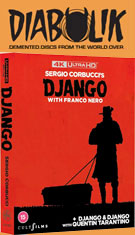

Color, 1966, 91 mins. 37 secs.
Directed by Sergio Corbucci
Starring Franco Nero, Loredana Nusciak, Ángel Álvarez, Simón Arriaga, José Bódalo, José Canalejas, Eduardo Fajardo
Cult Films / Argent (UHD, (Blu-ray & DVD) (UK R0 HD/PAL), Arrow Video (UHD & Blu-ray) (US R0/RA 4K/HD), Blue Undergrond (Blu-ray & DVD) (US RA/0 HD/NTSC), Arcadès (Blu-ray & DVD) (France RB/R2 HD/PAL), Anchor Bay (US R1 NTSC) / WS (1.66:1) (16:9)
For fans of European films, 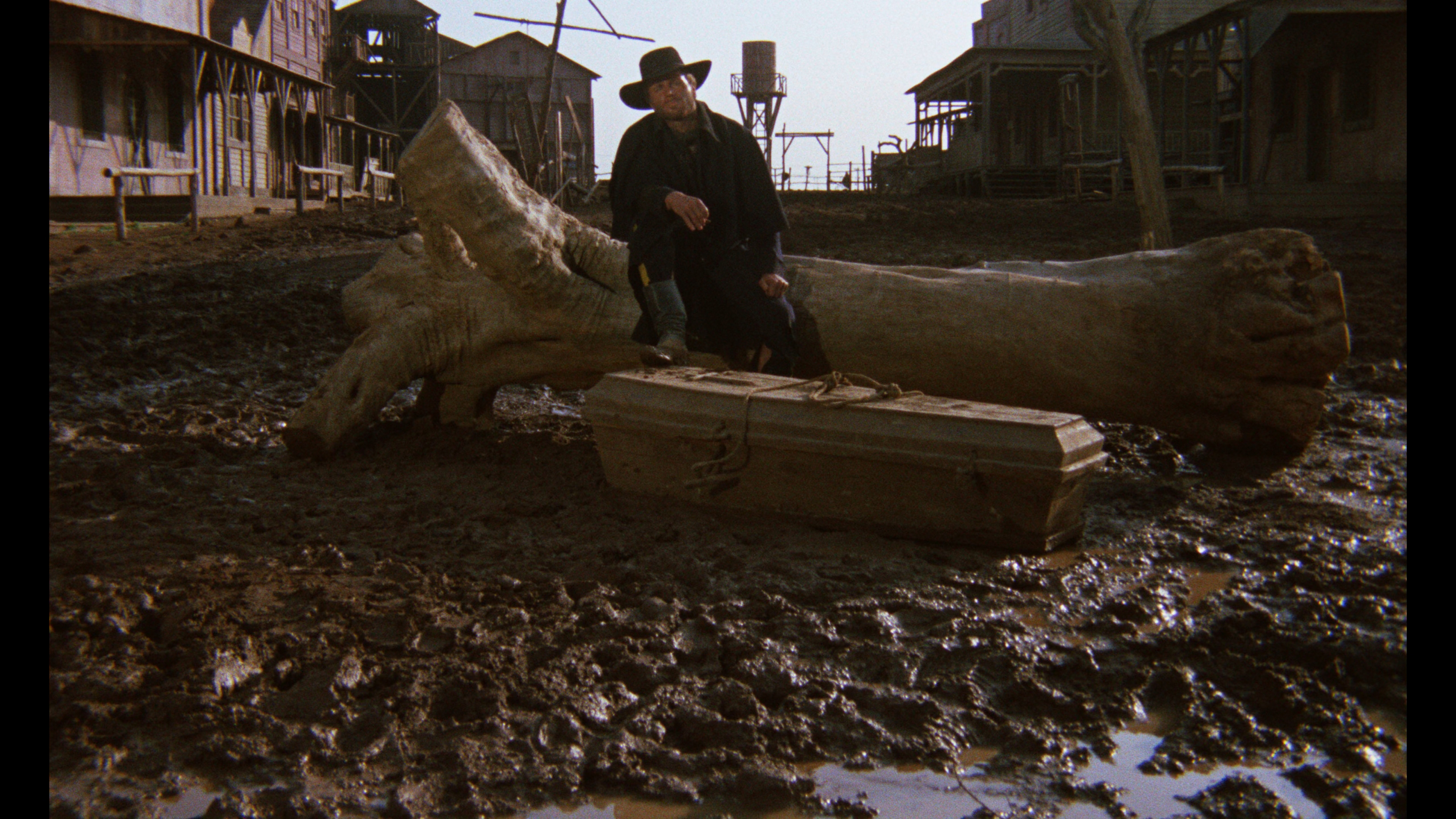 the name "Django" has long been synonymous with action-filled spaghetti westerns. For everyone else, it regrettably meant very
the name "Django" has long been synonymous with action-filled spaghetti westerns. For everyone else, it regrettably meant very 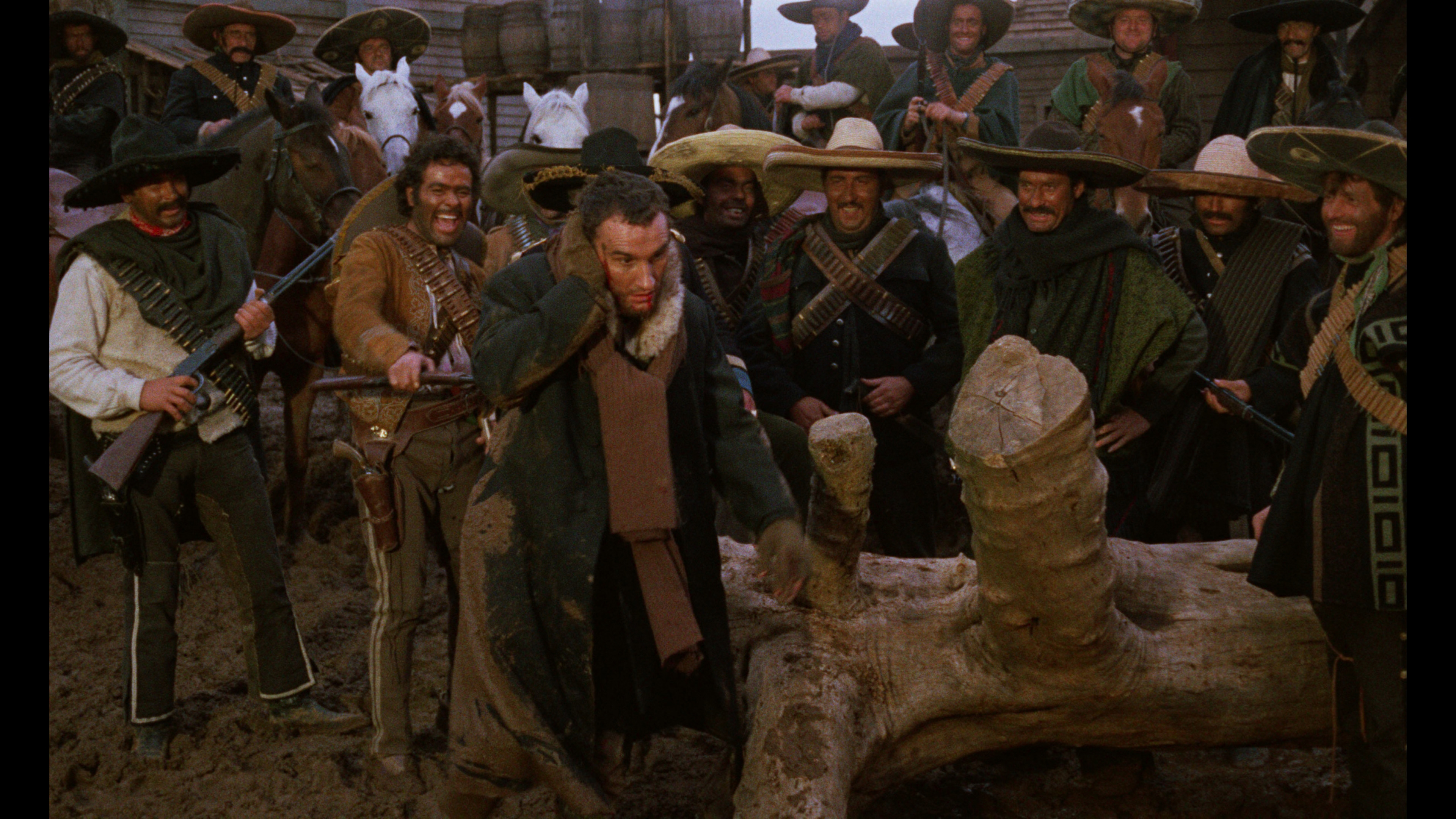 little for many years. A contemporary of Sergio Leone's legendary Dollars films with Clint Eastwood, Django is a much dirtier, rougher film which also injects conventions of Japanese cinema and pulp novels into the western framework. Perhaps due to its difficult title, Django never broke out of cult status in America but spread like wildfire over Europe, kicking off a host of tangentially related imitators which continued into the 1980s (and even beyond if you count Sukiyaki Western Django).
little for many years. A contemporary of Sergio Leone's legendary Dollars films with Clint Eastwood, Django is a much dirtier, rougher film which also injects conventions of Japanese cinema and pulp novels into the western framework. Perhaps due to its difficult title, Django never broke out of cult status in America but spread like wildfire over Europe, kicking off a host of tangentially related imitators which continued into the 1980s (and even beyond if you count Sukiyaki Western Django).
In the iconic opening sequence, Django (Nero) appears as an unassuming yet oddly sinister figure trudging through a muddy western town. Clad in a dirty coat and dragging a coffin behind him, he quickly makes enemies with a diabolical fallen Major and rescues a tied up young woman in peril. Staying near a saloon/brothel in town, our antihero finds himself in the middle of a war between the Major's faction of racist vigilantes and a band of Mexican revolutionaries, who have become more than a little curious about what Django's hiding in his coffin.
Far less polished and artistically ambitious than the Leone westerns, Django instead grabs the viewer's attention through the sheer stark force of its imagery and the unremitting nastiness of its violence. The infamous ear slicing scene alone should have been enough to leave mid-'60s audiences catatonic with shock, but the entire film really rolls around in the dirt and still packs a punch. With his grungy clothes and unshaven appearance, Nero makes a good laconic leading man; it's easy to see why he went Hollywood for a brief period after this film. The catchy score by Luis Bacalov is also a bit different from the usual Ennio Morricone whistling and guitars, taking on a more pop-oriented, modernist approach that still holds up well today.
Though it was very hard to find during the VHS age, Django earned more than its share of DVD incarnations followed by multiple Blu-ray and UHD releases. The first notable edition came from Anchor Bay in 2001 with a decent widescreen DVD transfer but only augmented by the clumsy dubbed English track which, unlike the Leone films, uses none of the actors' real voices and often sounds wildly inappropriate. The set also includes a color booklet detailing the history of the official and unofficial Django films (including 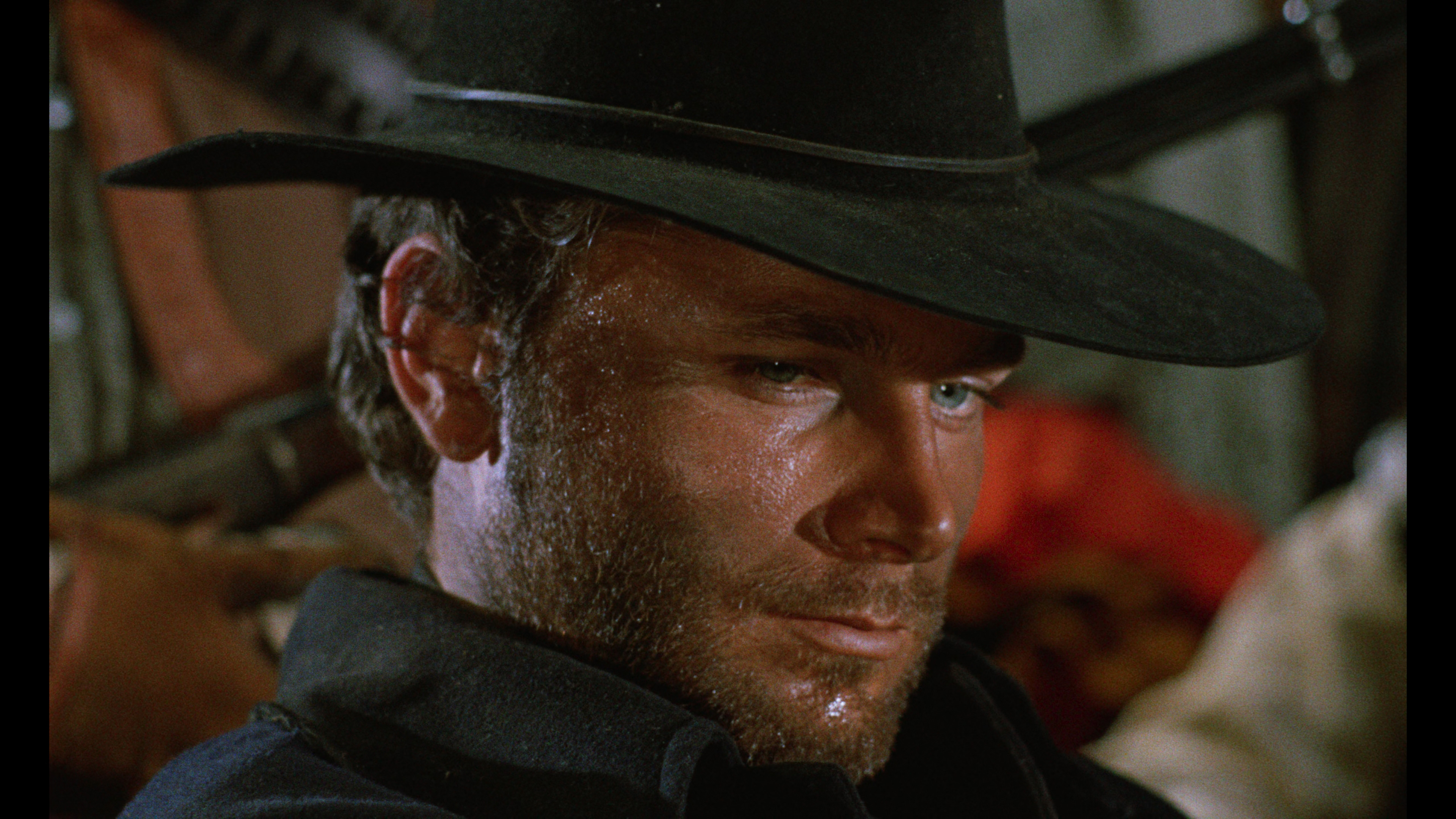 one sort-of-official Terence Hill sequel), complete with an eye-popping array of Italian poster art. Extra supplements include a trio of brief theatrical trailers (all pretty much the same in
one sort-of-official Terence Hill sequel), complete with an eye-popping array of Italian poster art. Extra supplements include a trio of brief theatrical trailers (all pretty much the same in 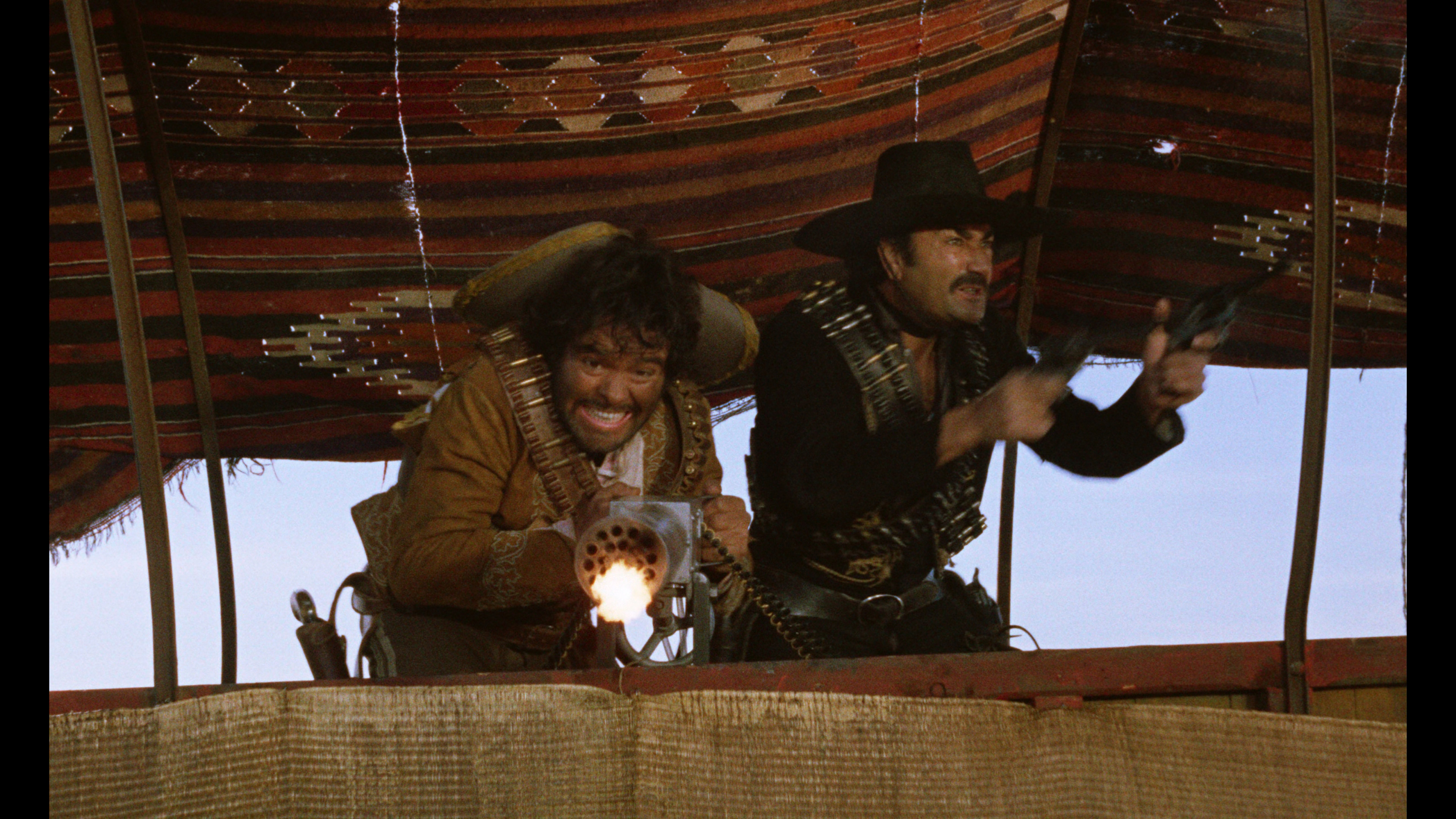 tone), a 6m56s Franco Nero interview in which the well-preserved actor fondly discusses his legendary role, and a "Django shooting game" the viewer can play with the DVD remote control. Packaged with Anchor Bay's original Django two-disc edition comes a much more obscure companion feature, Django Strikes Back, in which Franco Nero reprises his role twenty years later. Originally released in Italy as Django 2: Il Grande Ritorno, the film was never officially released in the United States, even as a straight to video title. While the character may be the same, the jungle setting, low budget '80s photography, and massive rapid-fire gun play put this more in the league of Italy's Rambo knockoffs, such as the Indio series. Adding to the peculiarity of the project is a Laura Gemser-style bondage queen figure and some increased salacious sexual material, far more blatant than what was suggested in the first film. Of course, the character of Django seemed more interested in pleasures of the flesh than the average "Man with No Name" spaghetti western hero, so this may have been a logical step forward.
After years of living in solitude as a monk, Django is called back into service to rescue his daughter from the clutches of the evil Christopher Connelly (sporting a funny Udo Kier accent), who is running a steamer through the South American jungle. Along the way he meets the peculiar Gunn (Donald Pleasence) and a host of other bizarre characters before finally breaking out his trusty Gatling gun. While it's always good to see Nero back in action, Django Strikes Again never really catches fire like the original film. The constant waffling between genres, coupled with flat direction by "Ted Archer" (Nello Rossatti), makes it more of a passable action piece than a true return to form, but its long overdue release is certainly welcome. This edition includes a subtitled five-minute Italian prologue scissored from the English print prepared for export, basically an amusing vignette with two old timers trying to recall the name of "that guy with the coffin" before being blown away. Aside from the slightly dupey opening, the image quality is very good, if a bit murky during the night scenes. The English surround soundtrack features most of the performers' original voices, a very welcome touch, but features a rather primitive sound mix with some sloppy channel separation (ditto for the alternate Italian track). Also included is the trailer and another brief Nero interview in which he discusses the genesis of the sequel. Both films feature
tone), a 6m56s Franco Nero interview in which the well-preserved actor fondly discusses his legendary role, and a "Django shooting game" the viewer can play with the DVD remote control. Packaged with Anchor Bay's original Django two-disc edition comes a much more obscure companion feature, Django Strikes Back, in which Franco Nero reprises his role twenty years later. Originally released in Italy as Django 2: Il Grande Ritorno, the film was never officially released in the United States, even as a straight to video title. While the character may be the same, the jungle setting, low budget '80s photography, and massive rapid-fire gun play put this more in the league of Italy's Rambo knockoffs, such as the Indio series. Adding to the peculiarity of the project is a Laura Gemser-style bondage queen figure and some increased salacious sexual material, far more blatant than what was suggested in the first film. Of course, the character of Django seemed more interested in pleasures of the flesh than the average "Man with No Name" spaghetti western hero, so this may have been a logical step forward.
After years of living in solitude as a monk, Django is called back into service to rescue his daughter from the clutches of the evil Christopher Connelly (sporting a funny Udo Kier accent), who is running a steamer through the South American jungle. Along the way he meets the peculiar Gunn (Donald Pleasence) and a host of other bizarre characters before finally breaking out his trusty Gatling gun. While it's always good to see Nero back in action, Django Strikes Again never really catches fire like the original film. The constant waffling between genres, coupled with flat direction by "Ted Archer" (Nello Rossatti), makes it more of a passable action piece than a true return to form, but its long overdue release is certainly welcome. This edition includes a subtitled five-minute Italian prologue scissored from the English print prepared for export, basically an amusing vignette with two old timers trying to recall the name of "that guy with the coffin" before being blown away. Aside from the slightly dupey opening, the image quality is very good, if a bit murky during the night scenes. The English surround soundtrack features most of the performers' original voices, a very welcome touch, but features a rather primitive sound mix with some sloppy channel separation (ditto for the alternate Italian track). Also included is the trailer and another brief Nero interview in which he discusses the genesis of the sequel. Both films feature 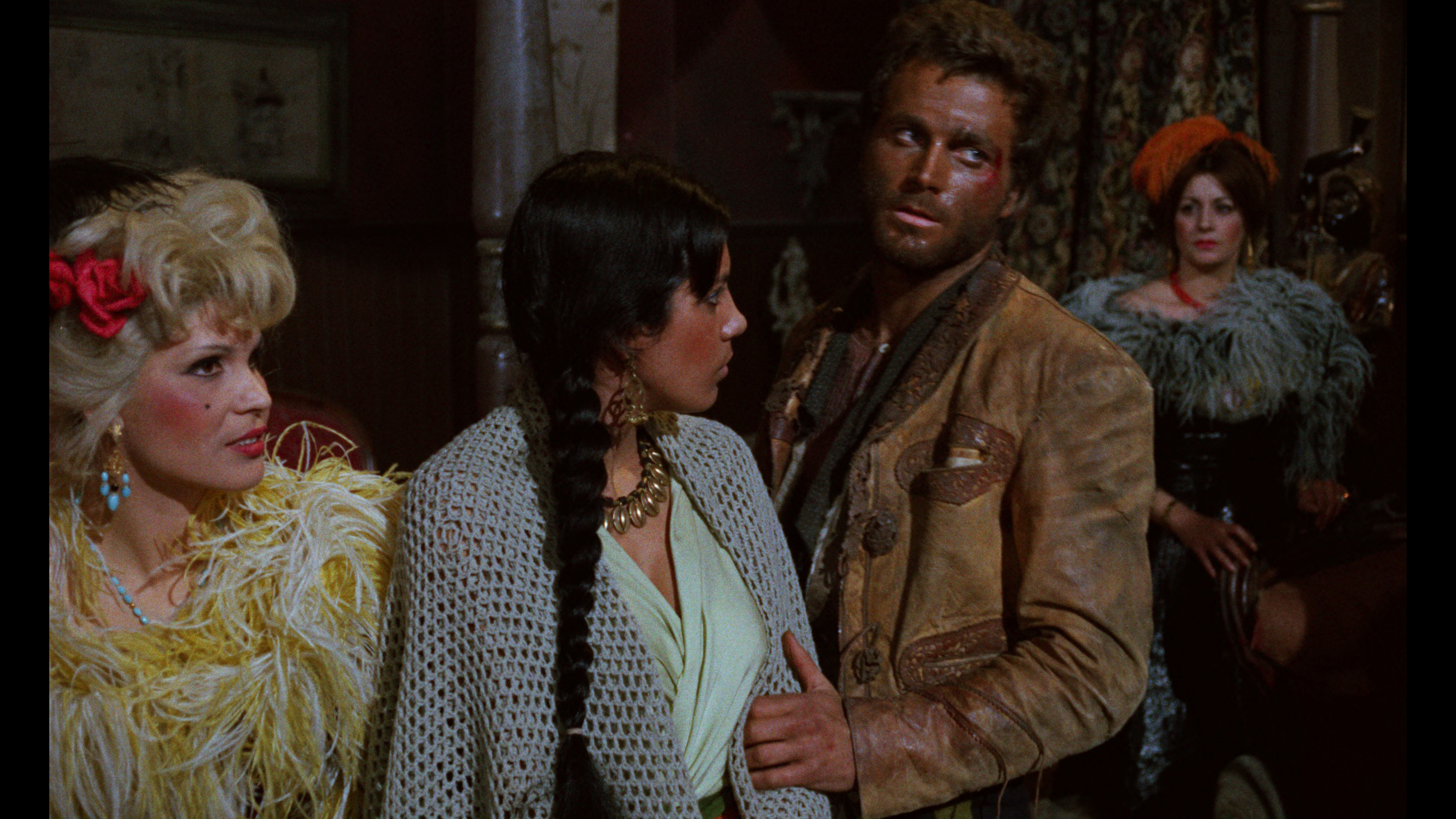 some terrific animated menus, including hilarious faux-Spanish menu options and nifty bullet-ripping
some terrific animated menus, including hilarious faux-Spanish menu options and nifty bullet-ripping 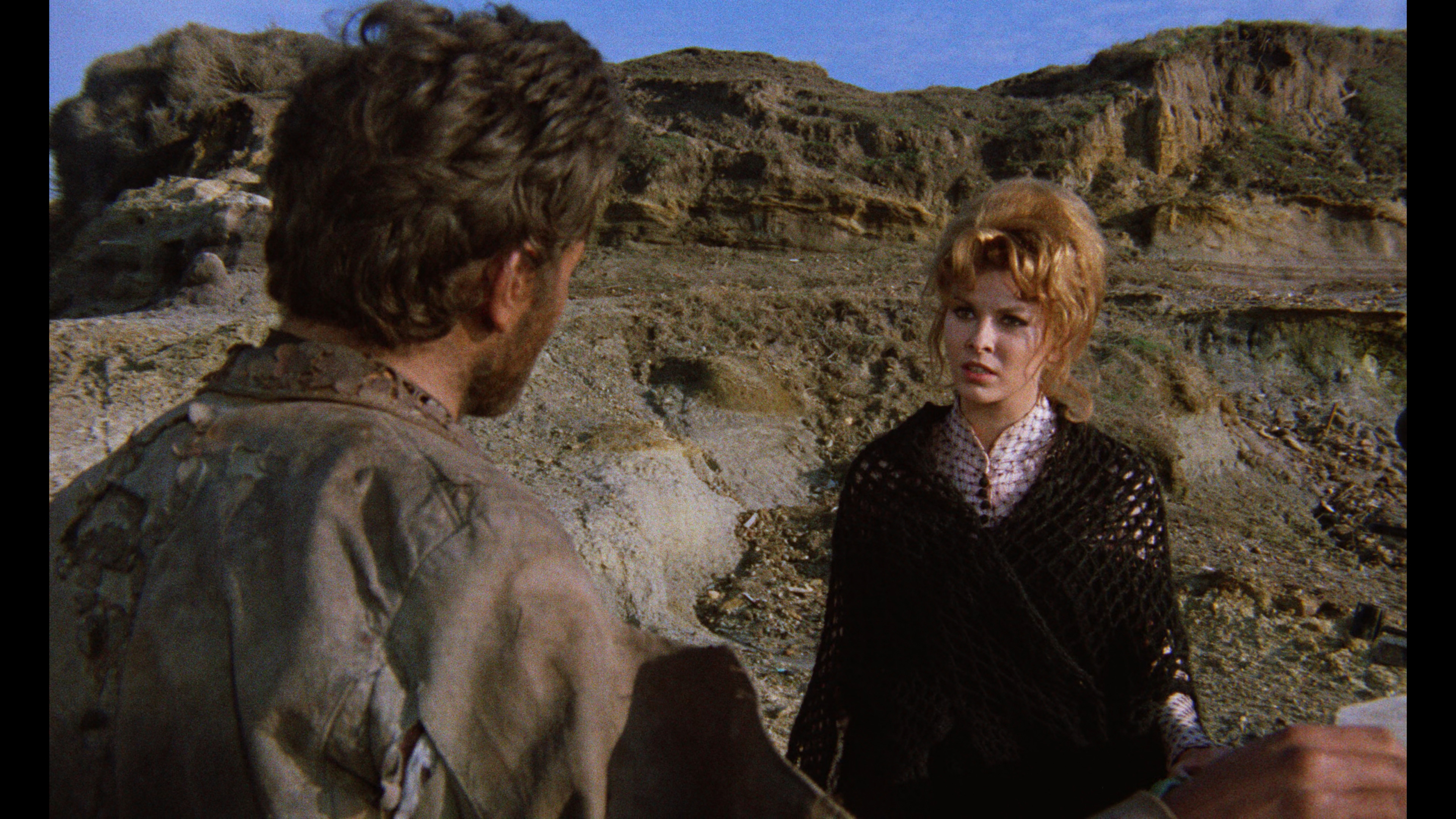 effects.
effects.
After Blue Underground inherited the bulk of Anchor Bay's worthwhile Euro offerings, the company reissued Django at the beginning of 2003 in a significantly improved anamorphic transfer from the longer original negative (a minute more than the DVD), which restored various fleeting bits of footage lost to damage and censorship over the years. This version, initially rolled out as the headlining release in their four-disc Spaghetti Western box set, not only looks fresher but also includes both the English and Italian audio tracks with optional English subtitles. The Italian track is much more literate and appropriate, not to mention considerably more shocking with much more volatile racist language from the villains and a key recitation of the Lord's Prayer during the climax. Extras on this version include a different Franco interview, "Django: The One and Only," along with contributions from assistant director Ruggero Deodato. It's a solid piece that covers the film's influence, its international Italian/Spanish creation and shooting conditions, and Nero's reflections on his career following this star-making role, while Deodato recalls getting his start under the wing of Sergio Corbucci. Also included are the theatrical trailer and a poster and stills gallery. The following year, the long-standing UK ban on the film allowed it finally appear on DVD courtesy of Argent, who carried over only the international trailer and instead augmented their release with a video appraisal by fan Alex Cox, who largely spearheaded this film's revival in England.
Flash forward to 2010, with Django making the leap into the Blu-ray era courtesy of Blue Underground. The HD transfer is also sourced from the same negative used for the previous release, but it's too bright and pale with a heavy soaking of scanner noise adding to the muck. Some inherent damage in the negative has been conspicuously cleaned up here compared to the DVD (included some scratches here and there and some jumpy scene transitions). The Italian and English tracks are again present with optional English subs, except now both are in uncompressed Dolby Digital HD mono. The Blu-ray (which is Region A locked, unlike the region-free DVD) features a quick half-minute Franco Nero intro and carries over the same Nero/Deodato interview, while adding on a perplexing but stylish short film, "The Last Pistolero," with Nero playing another Django-style gunslinger in a much more recent, artsy short film. The niftiest extra here is easily "Western, Italian Style," a great 1968 mini-documentary on the phenomenon originally included elsewhere in the BU Spaghetti Western box. Frank Wolff (best remembered for The Great Silence and The Lickerish Quartet) lends his recognizable voice as narrator of the piece, which reels through some of the most influential films of the period and features some great on-set footage. Among the highlights are a young, buff Enzo G. Castellari demonstrating how to play out a fist fight for his actors and interviews with the likes of Sergio Sollima and Sergio 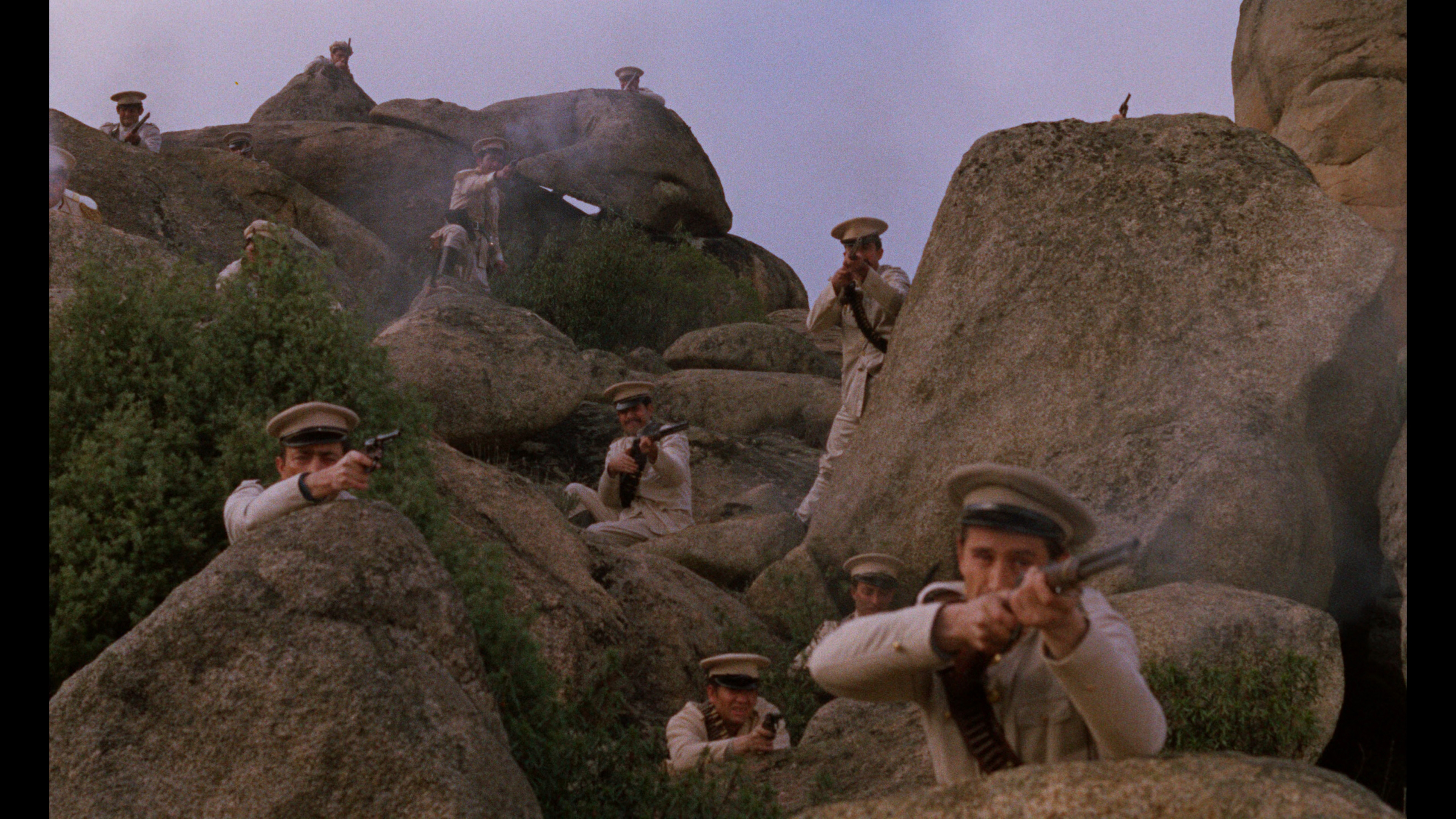 Corbucci. It's definitely 38 minutes wonderfully spent. Also included are both the international trailer and the more recently uncovered Italian
Corbucci. It's definitely 38 minutes wonderfully spent. Also included are both the international trailer and the more recently uncovered Italian 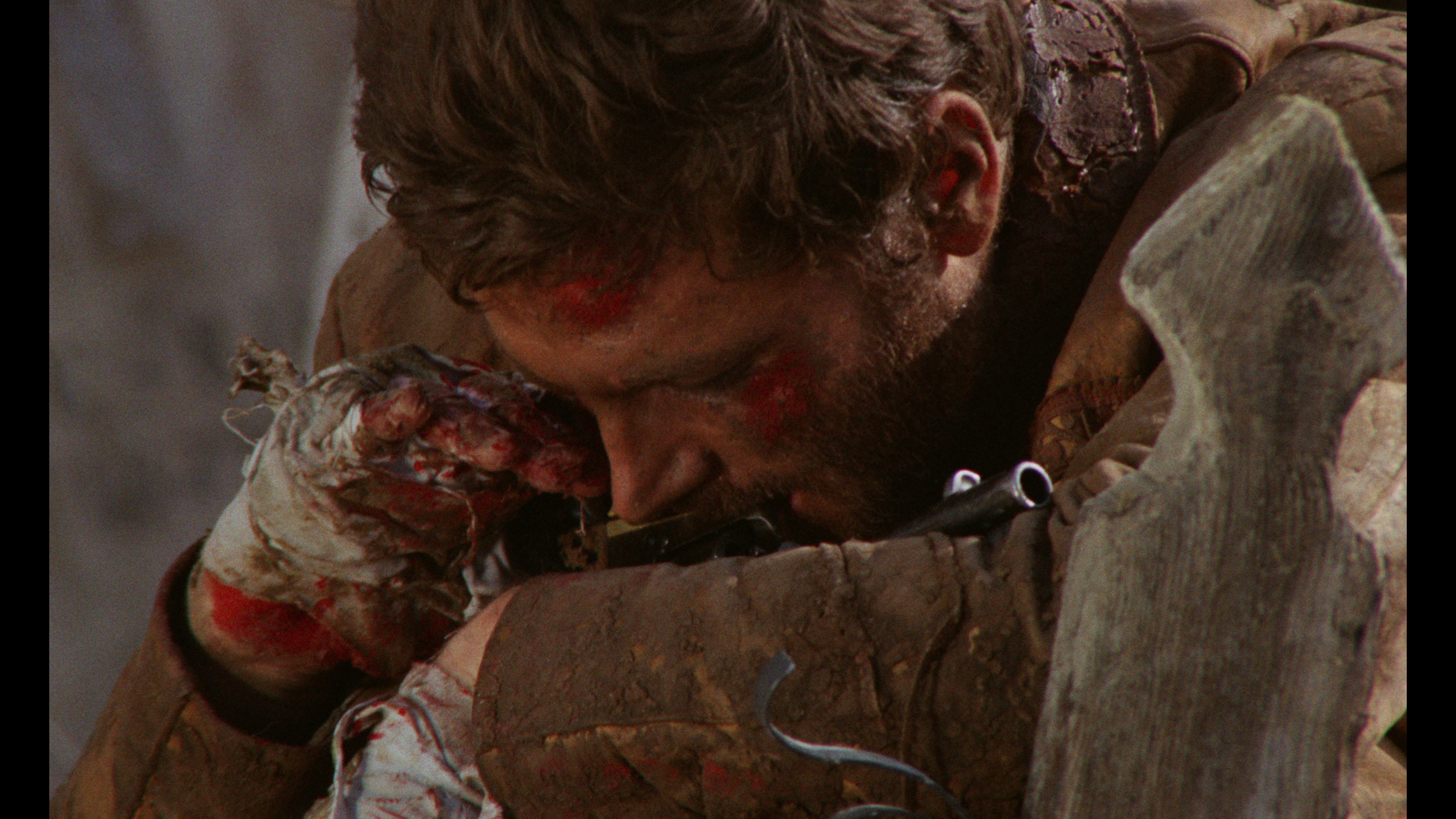 trailer.
trailer.
Of course, awareness of this film and its progeny spiked considerably in late 2012 with the release of Quentin Tarantino's Django Unchained, a Southern tale of vengeance, slavery, and gun play with a few nods to Corbucci's film, most obviously the name of its lead character and a Nero cameo. That film inspired a slew of spaghetti western releases including a few in the UK, the most notable being Argent's early 2013 presentation of Django as a new Blu-ray.
It's taken from the same scan as the Blue Underground disc, with all the issues that entails. Both Blu-rays have the same English and Italian audio options, though the Argent disc presents them in DTS-HD two-channel mono. The Argent disc (which manages to reference Tarantino and his film at least six times on the packaging!) carries over the Italian and international trailers, the Alex Cox appreciation piece, a 3-minute international opening versus the Italian one seen on the main feature, and a 12-minute Franco video interview.
After some public scuffling between Blue Underground and Arrow Video that led to a very delayed release, the latter issued a U.S. UHD edition in 2021 (which started production in 2018 and was initially paired up with a Blu-ray of Texas Adios) along with a separate Blu-ray edition. Taken from a 4K scan with restoration conducted by Arrow itself, the presentation was a massive step up over its predecessors with real reds and blues, actual film grain, and much better detail. Featuring HDR-10 compatible Dolby Vision on the UHD, it's also the darkest presentation of the film to date which gives it a very shadowy, sinister feel at times. Uncompressed English and Italian 1.0 mono tracks are provided with English-translated or SDH subtitles, and both sound excellent. An audio commentary by Stephen Prince runs through all the necessary highlights involving the film including its Spanish locations, the cast members, the directorial trademarks of Corbucci, and the film's impact on the Italian western movement. "Django Never Dies" (26m7s) is a new, longer Nero interview about his approach to the role early in his career, his relationship with his director, and the impact it had on him on an international basis, while "Cannibal of the Wild West" (25m48s) is a new interview with Deodato about his experiences as an assistant director and what he remembers about Corbucci's abilities as a raconteur and filmmaker. "Sergio, My Husband" (27m48s) is an in-depth reminiscence with Nori Corbucci, wife of the director, who makes for a great listen as she chats about Corbucci's background before ascending to directing, his friendship with Sergio Leone, the young Deodato's contributions, and the deliberately fairy tale-like narrative approach this film favored. Several featurettes are ported over from the film's French home video release starting with "That's My Life: Part 1" (10m16s), in which co-writer Franco Rossetti talks about his involvement with this film and other around the same time as well as the conception of the main character and the depictions of death in the story. Then in "A Rock 'n' Roll Scriptwriter" (11m3s), co-writer Piero Vivarelli offers his own take on the development of the script and some other notable action, war, and western films connected to this one. In "A Punch in the Face" (18m43s), stunt man and actor Gilberto Galimberti delivers some very feisty stories about his many gigs at the time (including weapon master) and the kick of doing rambunctious bar brawls and shoot outs on films like this. Also included are the Alex Cox appreciation, the usual two trailers, and the new "Discovering Django" (23m33s) with scholar Austin Fisher parsing out the film's extensive influence on Italian westerns, his own connection to the source material, and the impact Nero had as a leading man compared to the Americans who came over around the same time to star in other films. The disc also features separate galleries for stills, posters, lobby cards, press coverage, and home video releases, courtesy of the Mike Siegel archive.
Finally we jump forward a bit to the end of 2023, as Cult Films (moving away from the Argento Films imprint it used before) revisited Django in two new iterations: a standalone UHD and a three-film "Cult Spaghetti Westerns" Blu-ray set. The main feature and its extras are the same either way, and the big surprise here is that, while taken from the same excellent 4K scan originally done in '18, it features some significant color timing differences. Most significantly, the appearance here is brighter and veers less on the orange side (see comparisons below), while framing and detail levels are the same. This time the English and Italian tracks are 2.0 PCM mono with improved English-translated or SDH subtitles, and as usual both sound pristine. The Cox piece and Nero interview are ported over here, and you also get "Django and Me" (20m20s), a new, different Deodato interview (presumably shot not long before his death), in which he's still in film storytelling form sharing lots of colorful Corbucci stories and touching on some of the other classic Italian filmmakers who impacted his work and creative outlook. A big extra here is the feature-length Django & Django (80m35s), Luca Res' 2021 documentary essentially serving as a parallel tribute to Corbucci and Tarantino featuring interviews with the latter along with Deodato and Nero. Seen as a streaming title on Netflix in most major territories, it's a very welcome addition here with a detailed look at how Corbucci's work had some surprising effects on multiple Tarantino films beyond the most obvious one. The UHD comes packaged with a very slick 64-page illustrated book featuring a Nero forward and "Django The Western Cranked-up!," an essay by Kevin Grant. Meanwhile the Blu-ray box also comes with separate discs devoted to two other excellent Italian westerns, A Bullet for the General and Keoma, both from the most recent excellent HD masters seen in the U.S. standalone releases and with improved SDH and translated English subtitles for their respective audio tracks as well. Keoma comes with an archival Enzo G. Castellari interview (15m50s), a 2022 interview with film editor Gianfranco Amicucci (37m39s), a 5m33s Alex Cox appraisal, and a more general Castellari interview (29m42s) covering his western and action films. Extras for A Bullet for the General include a Cox appreciation (7m7s) and an interview with director Damiano Damiani (17m31s) about this politically charged film and his experience shooting it a bit differently than the standard western.
Cult Films (UHD)
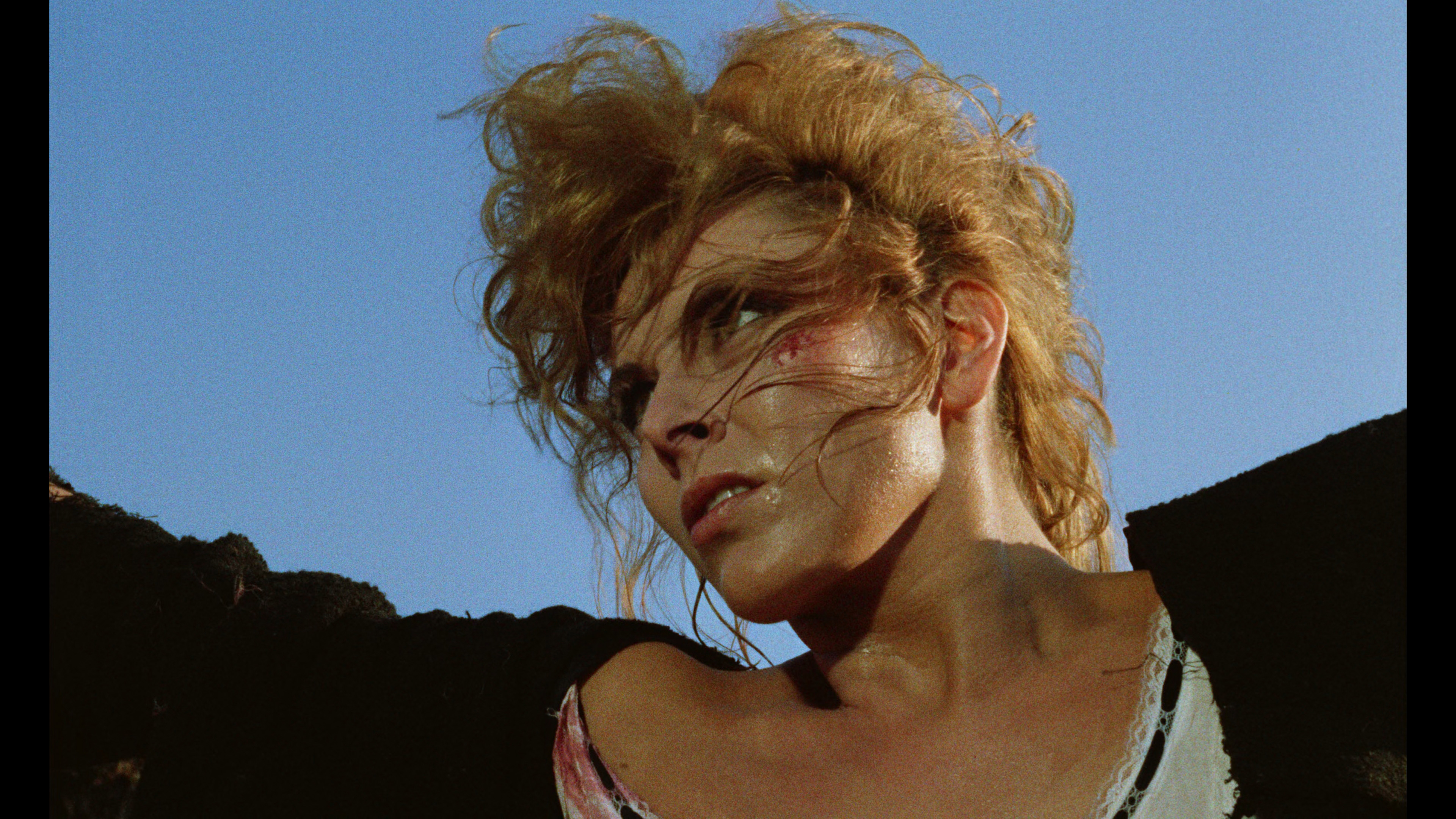
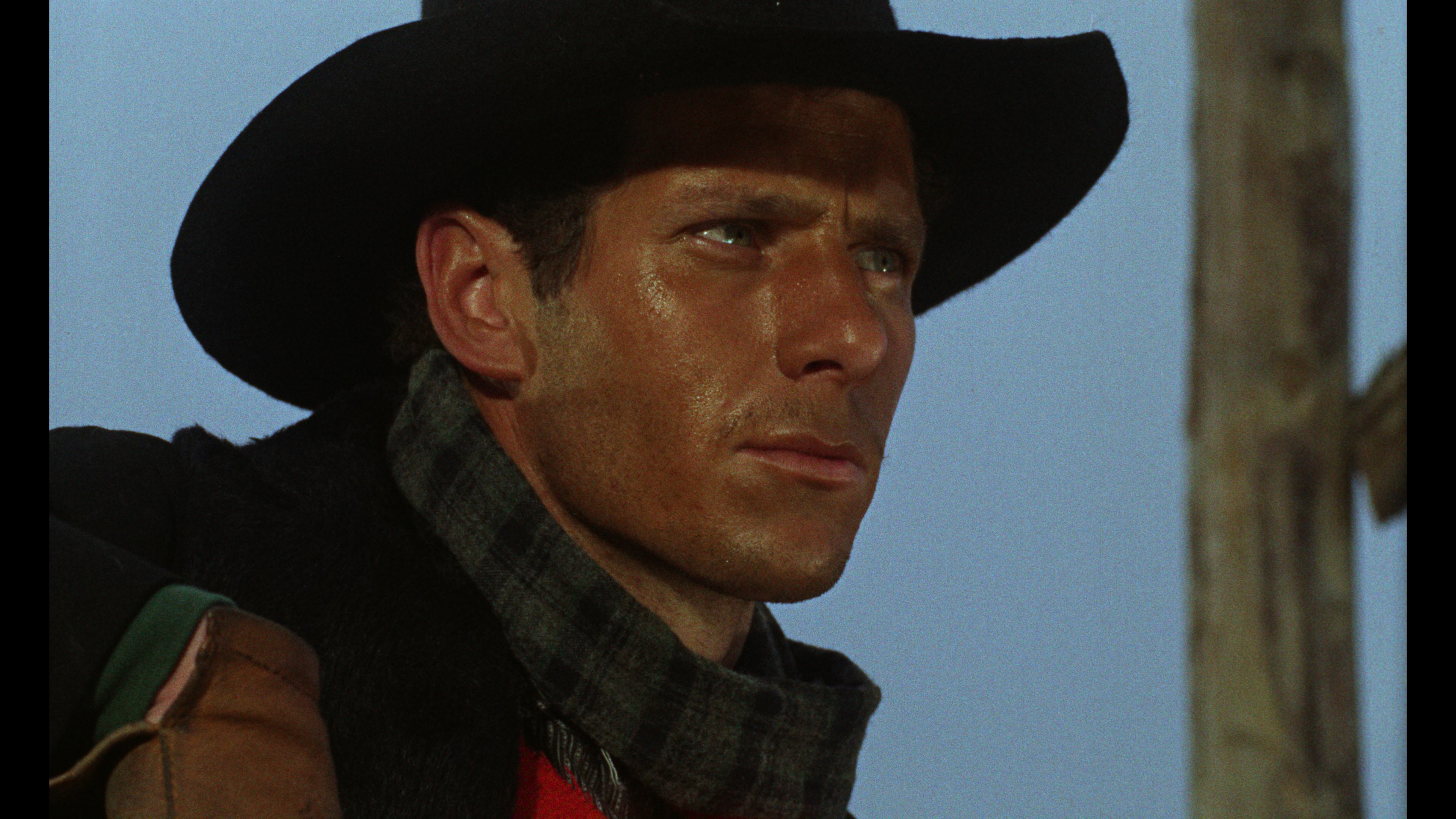
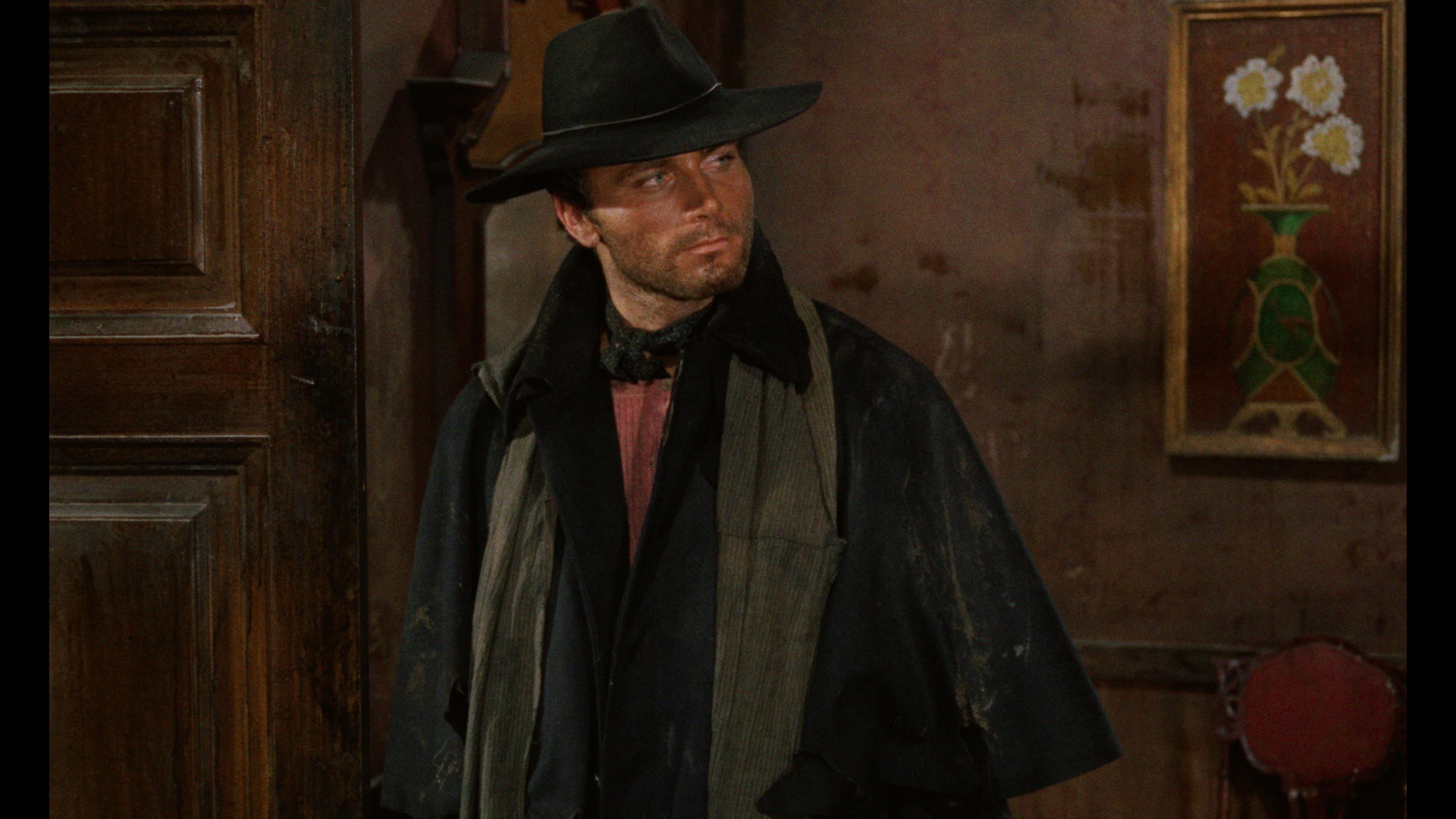
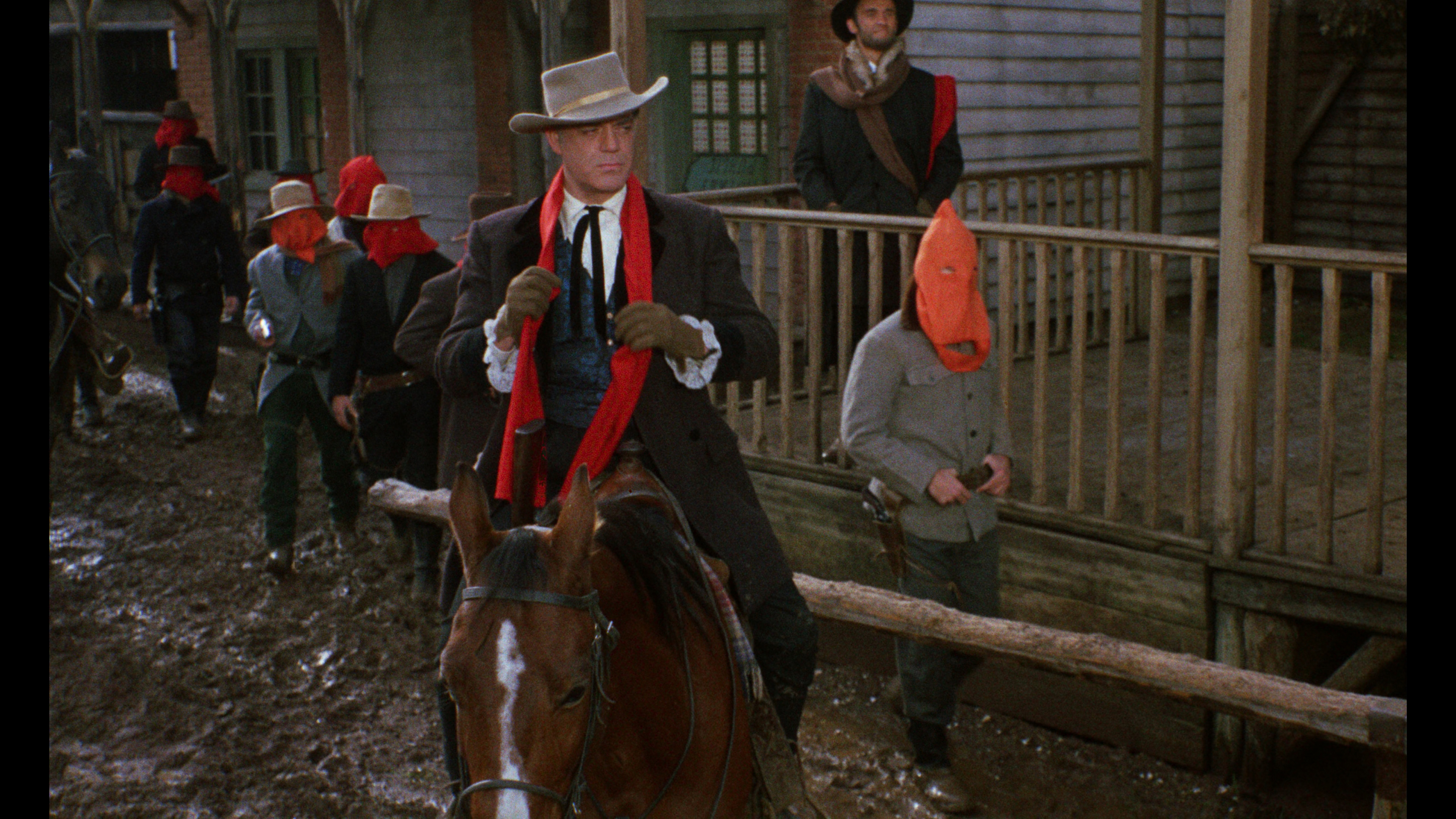
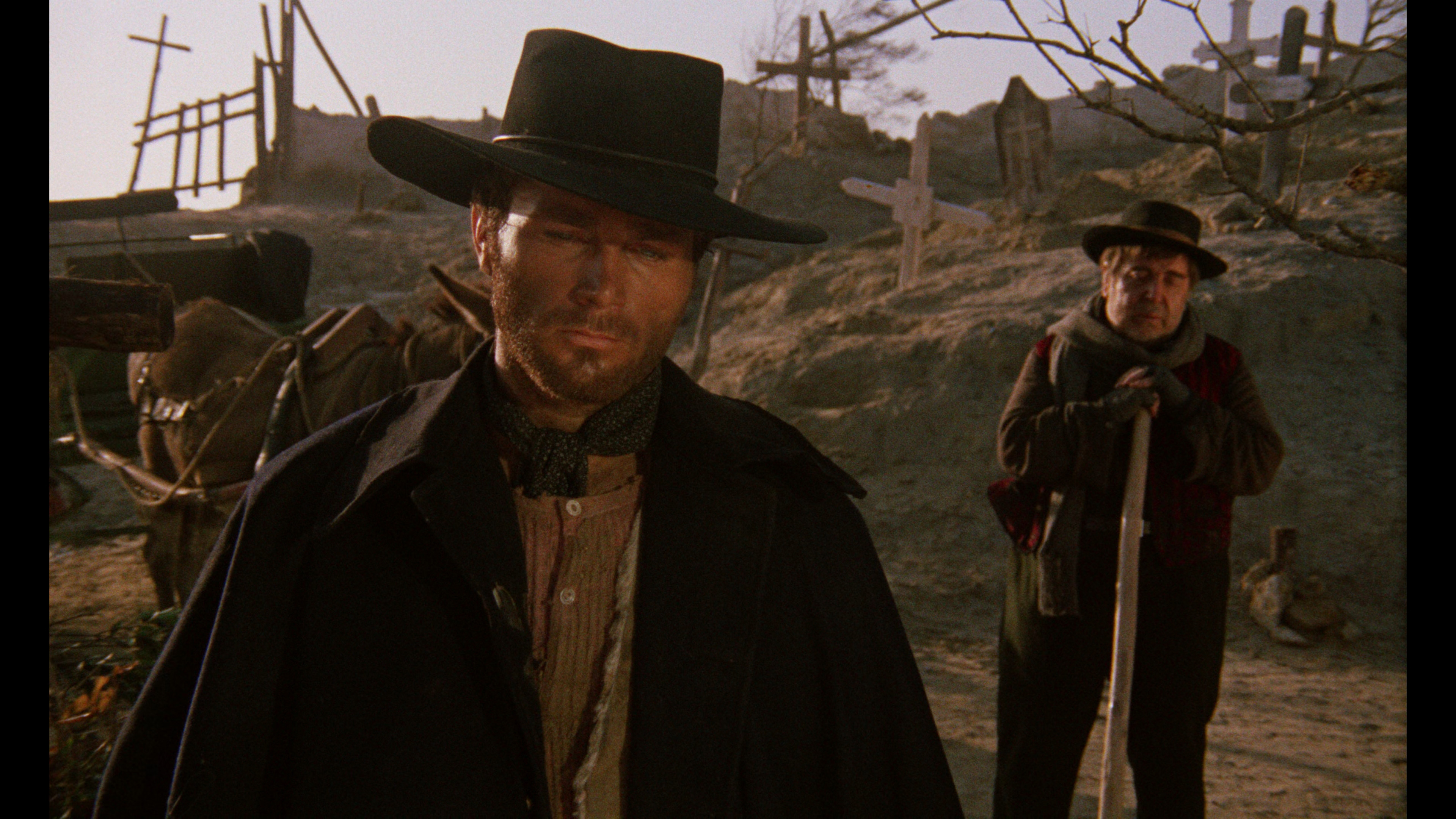
Arrow Video (UHD)
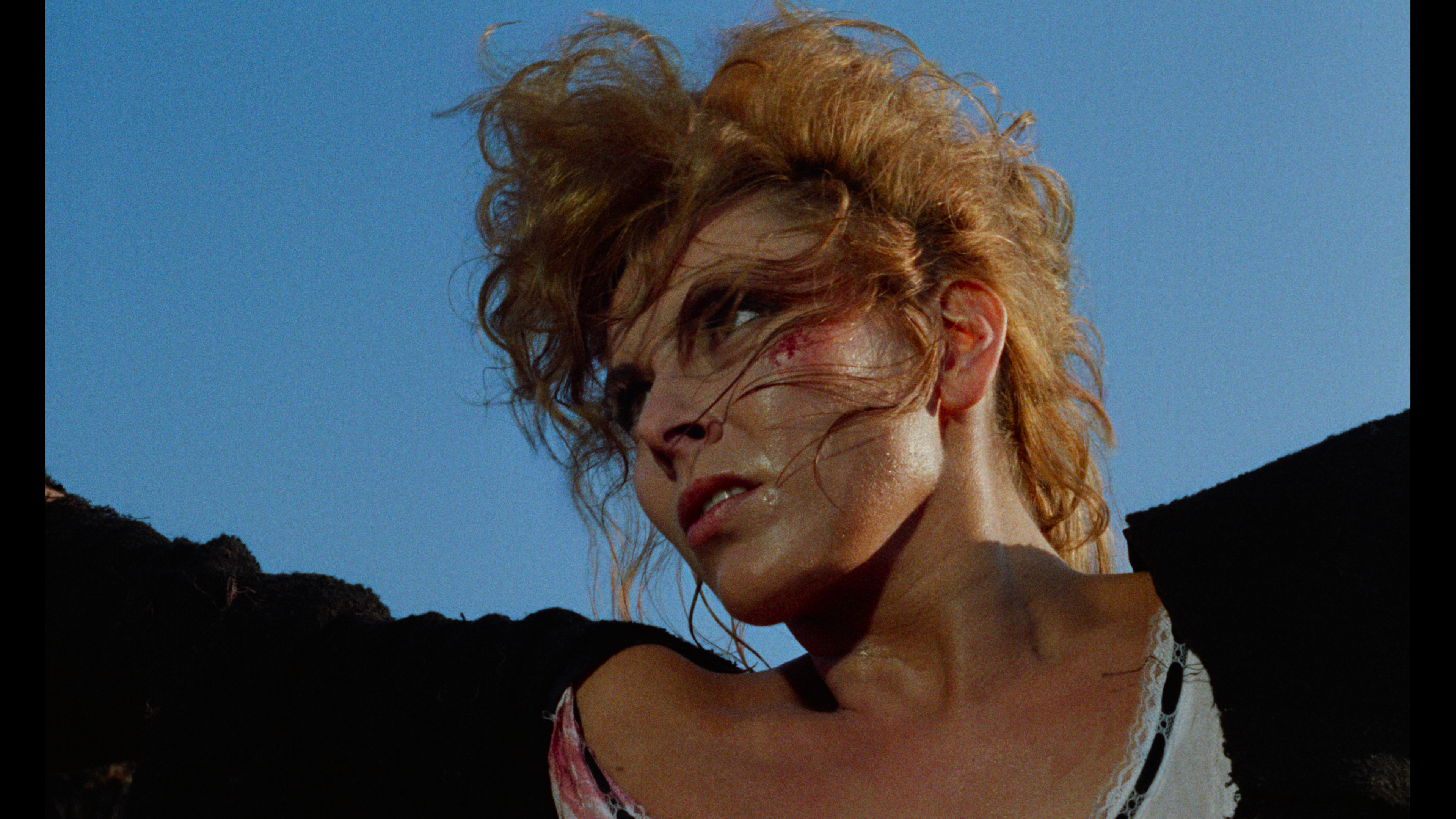
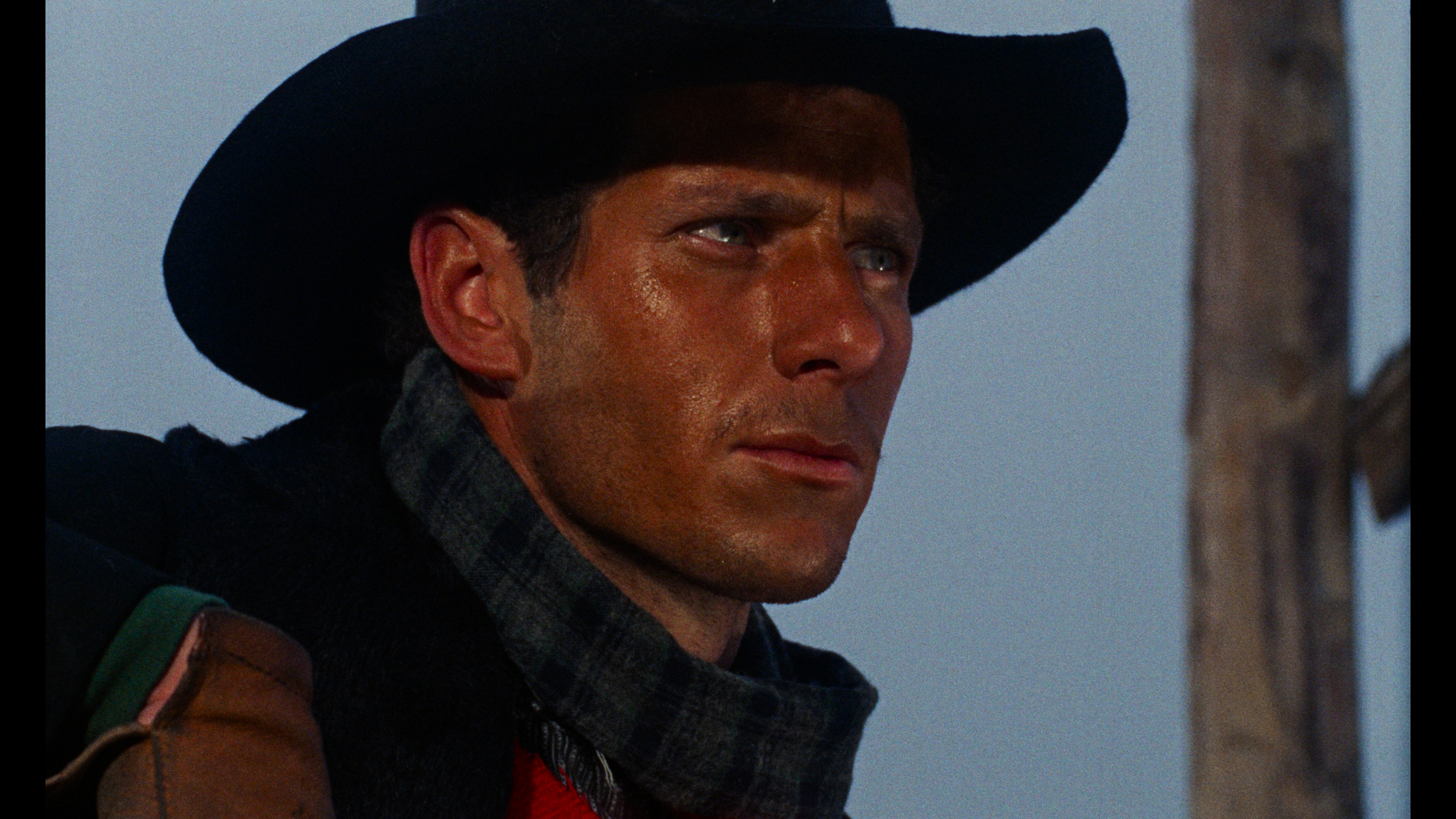
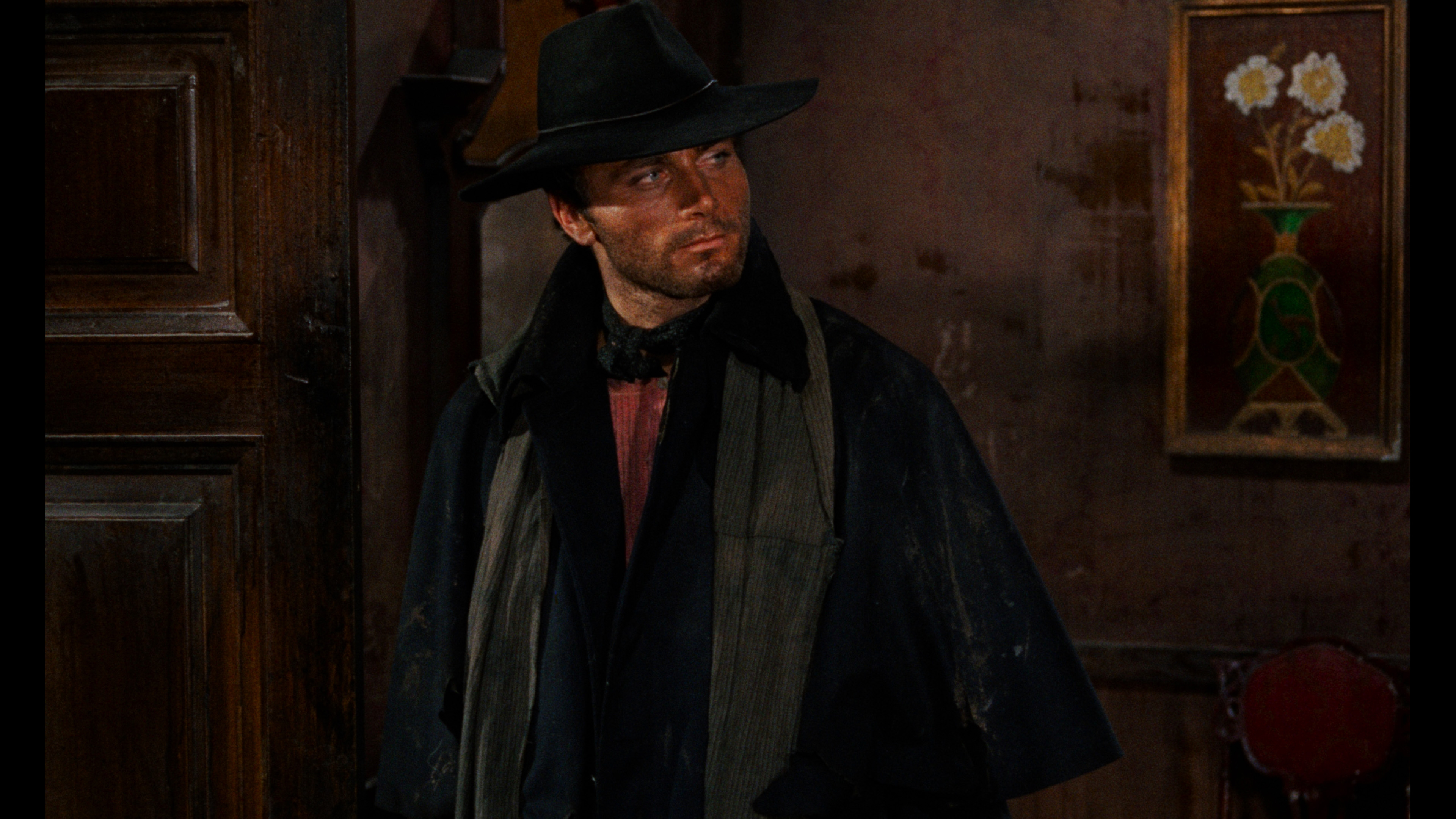
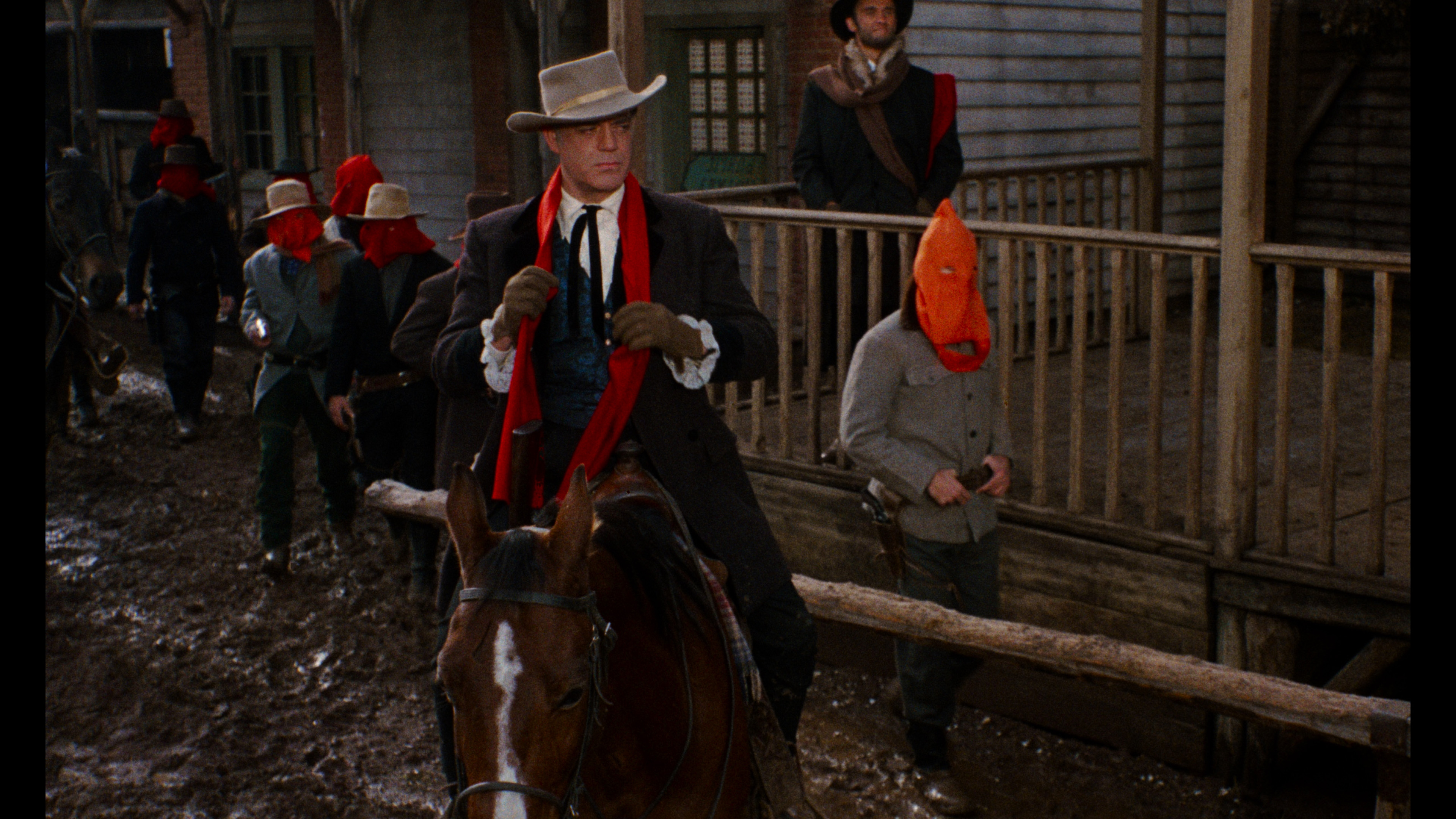
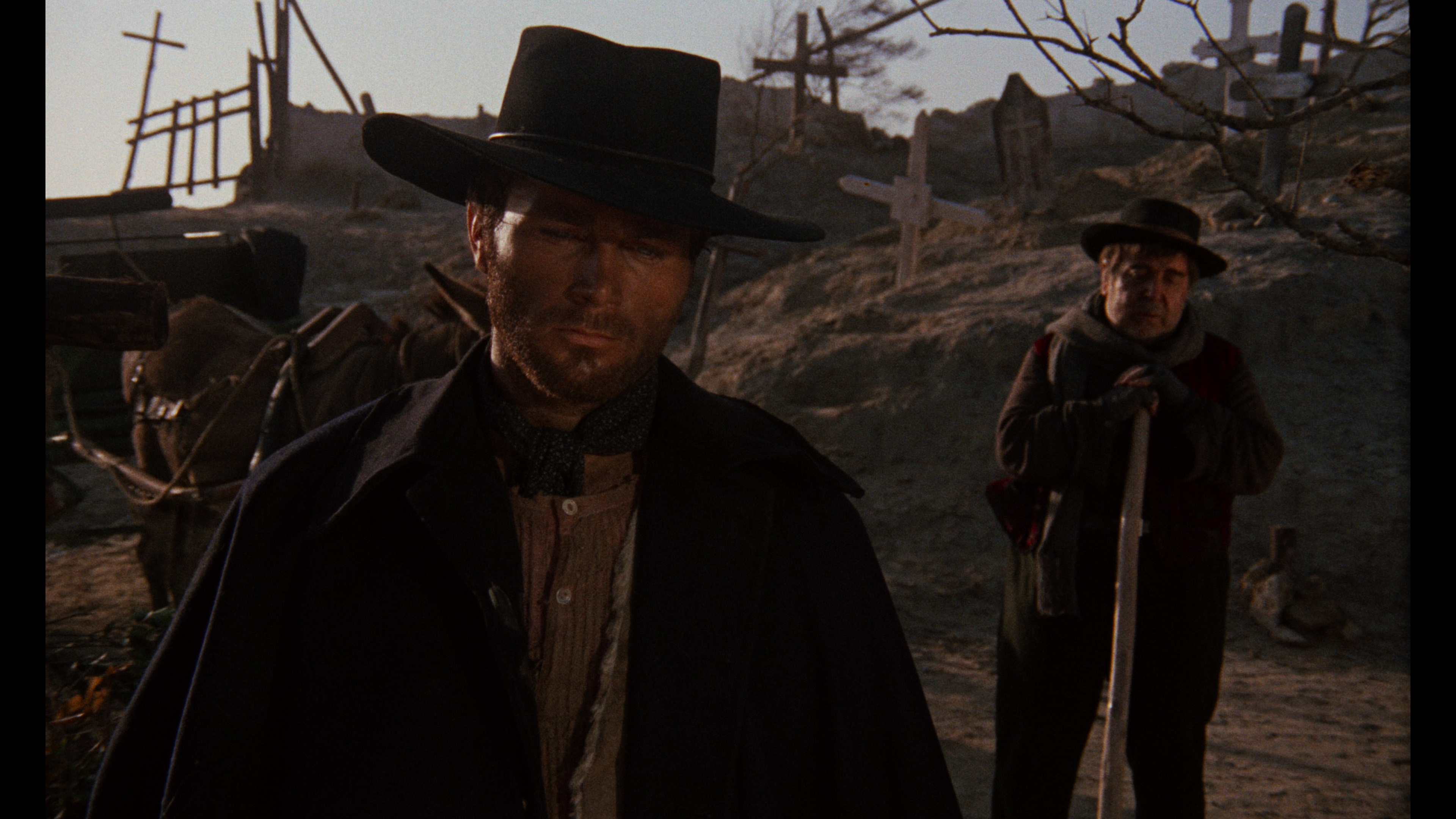
Argent (Cult Films) (Blu-ray)
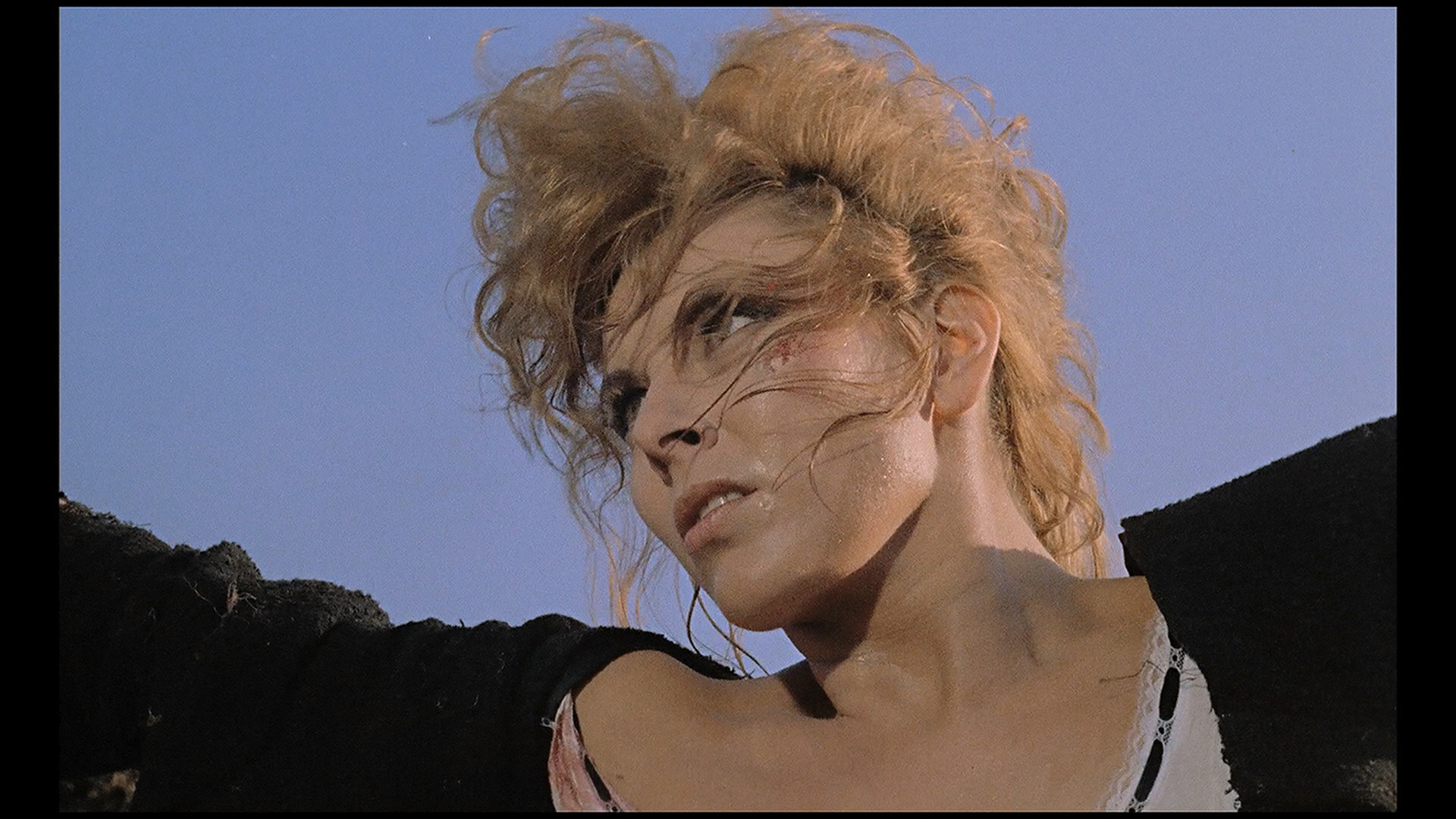
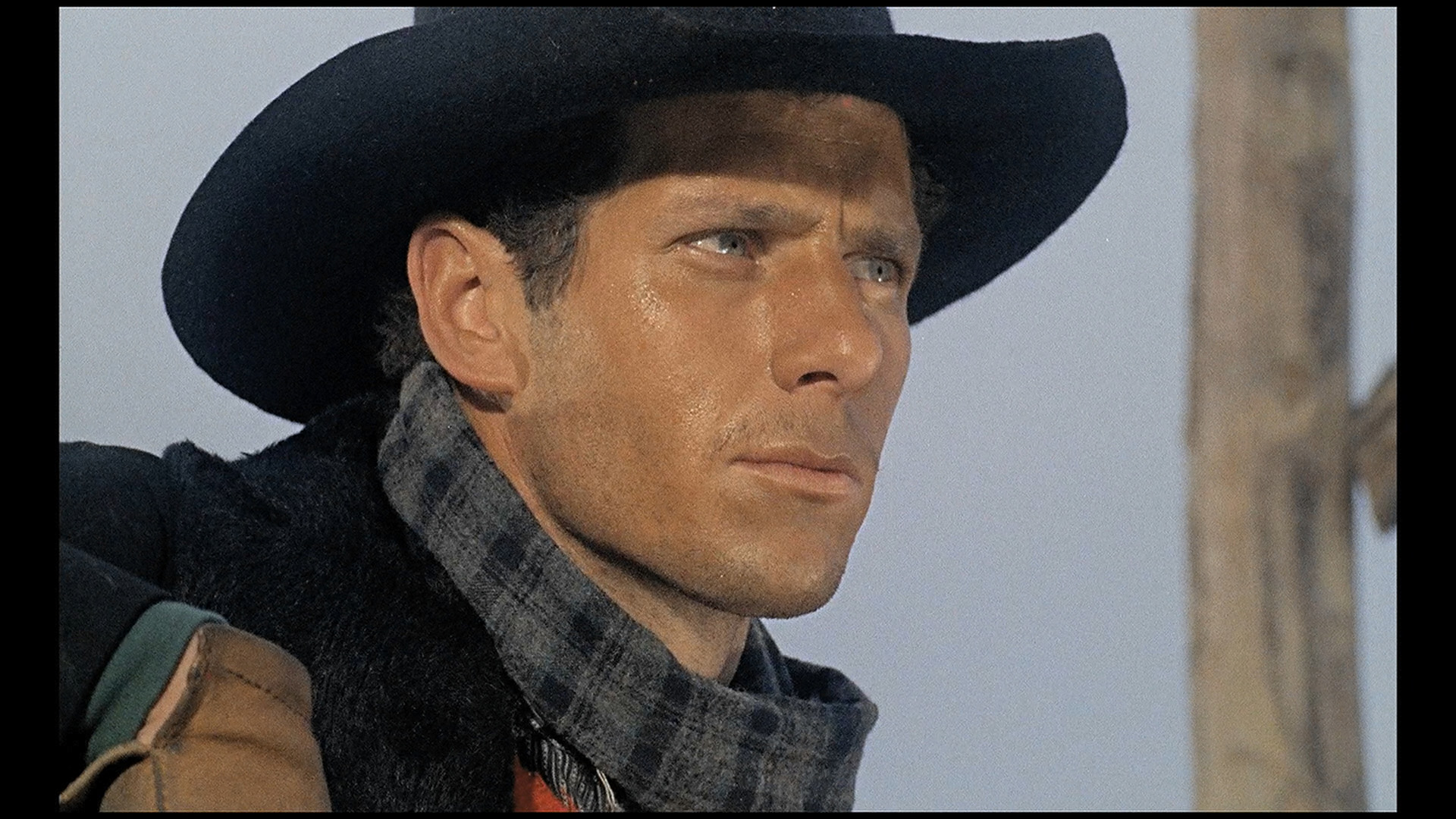
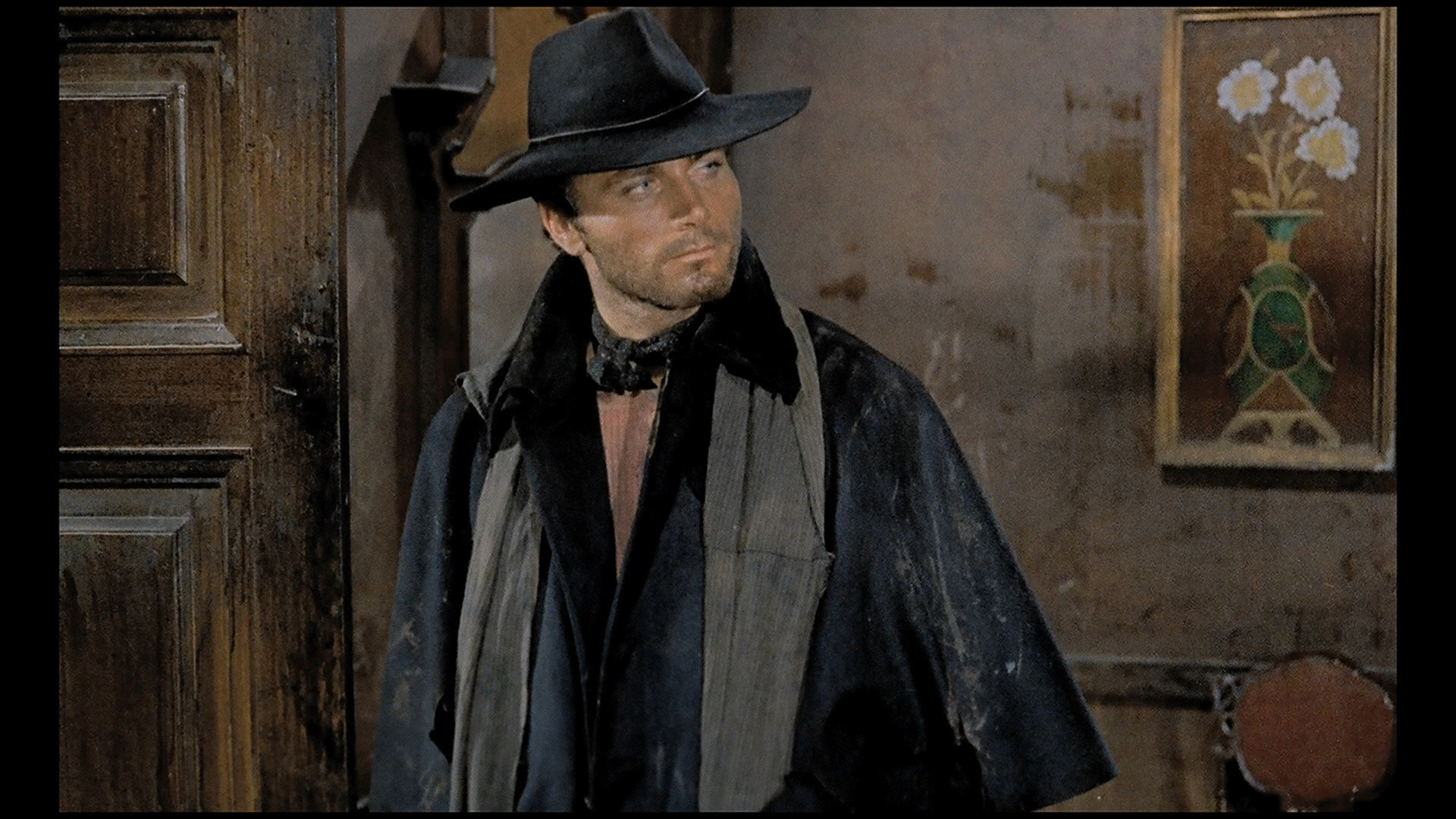
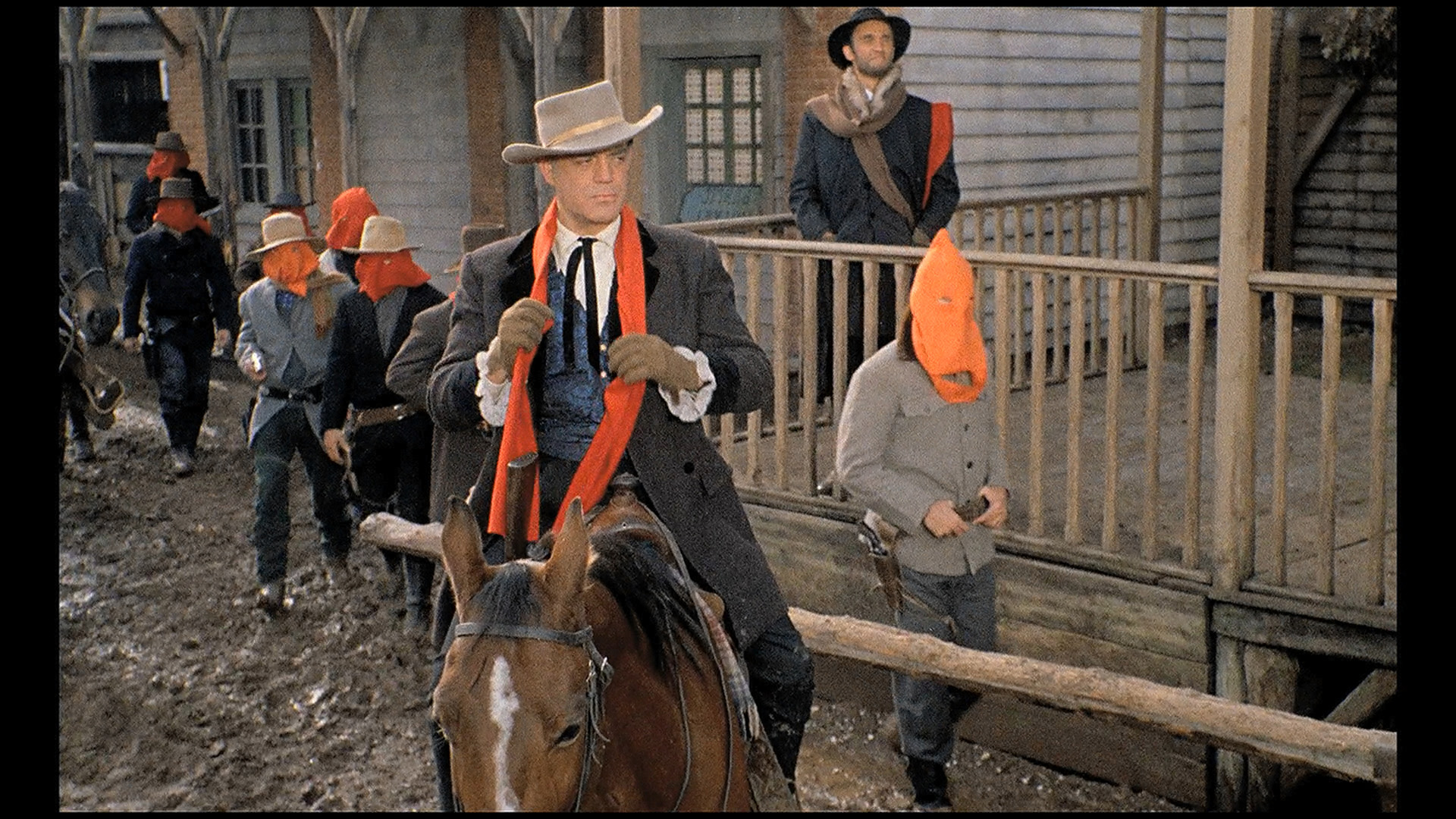
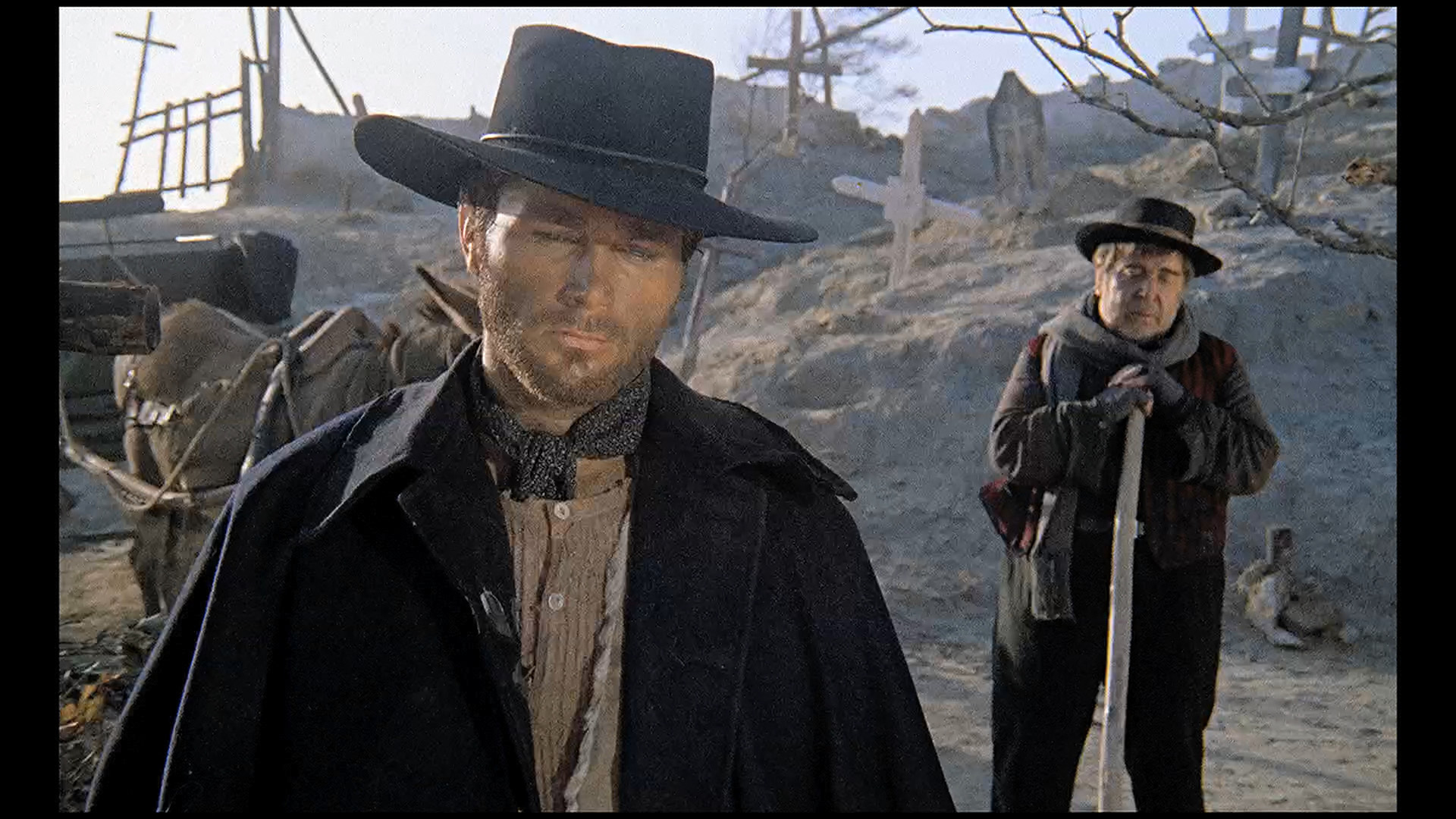
Blue Underground (Blu-ray)
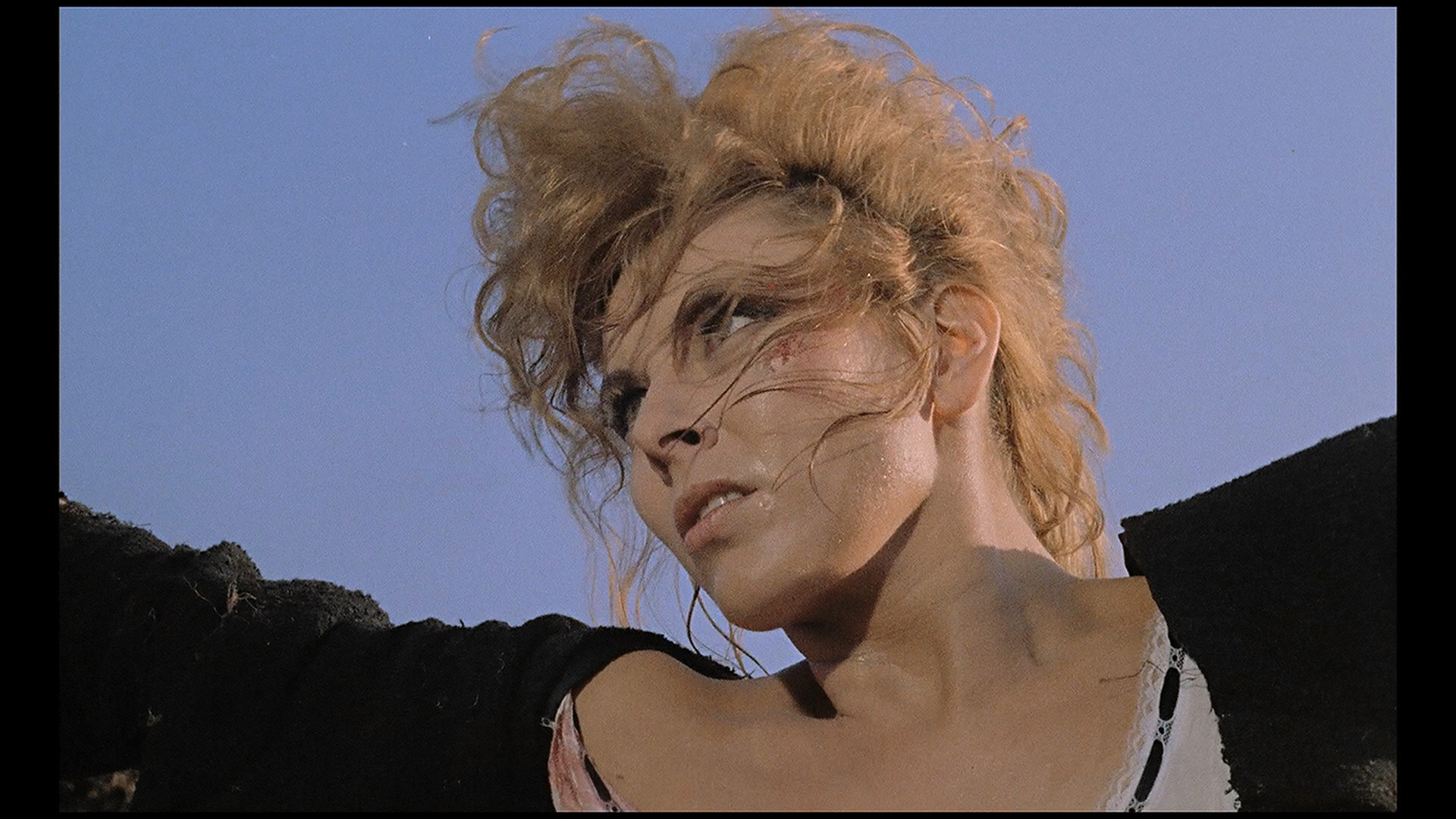
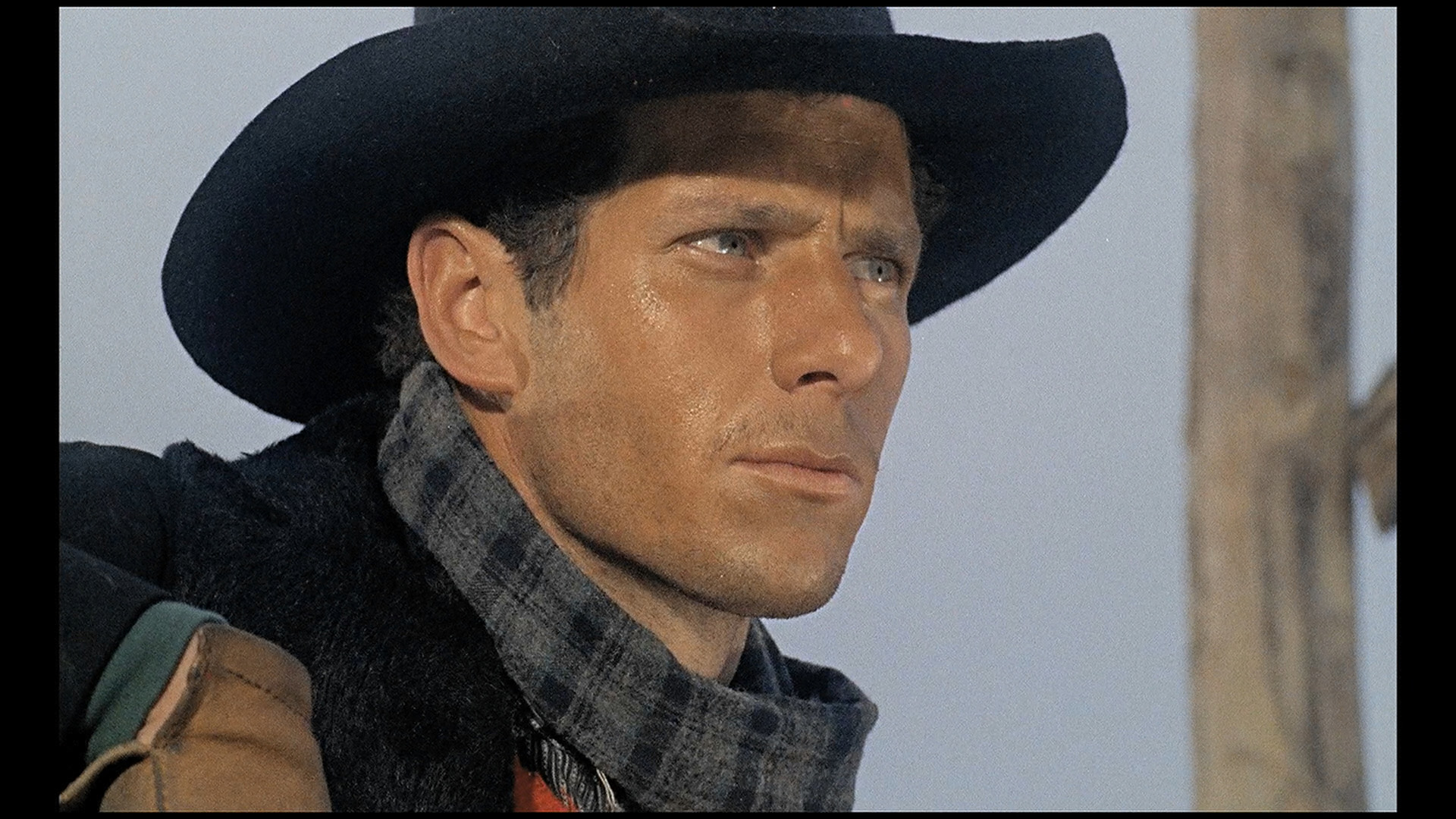
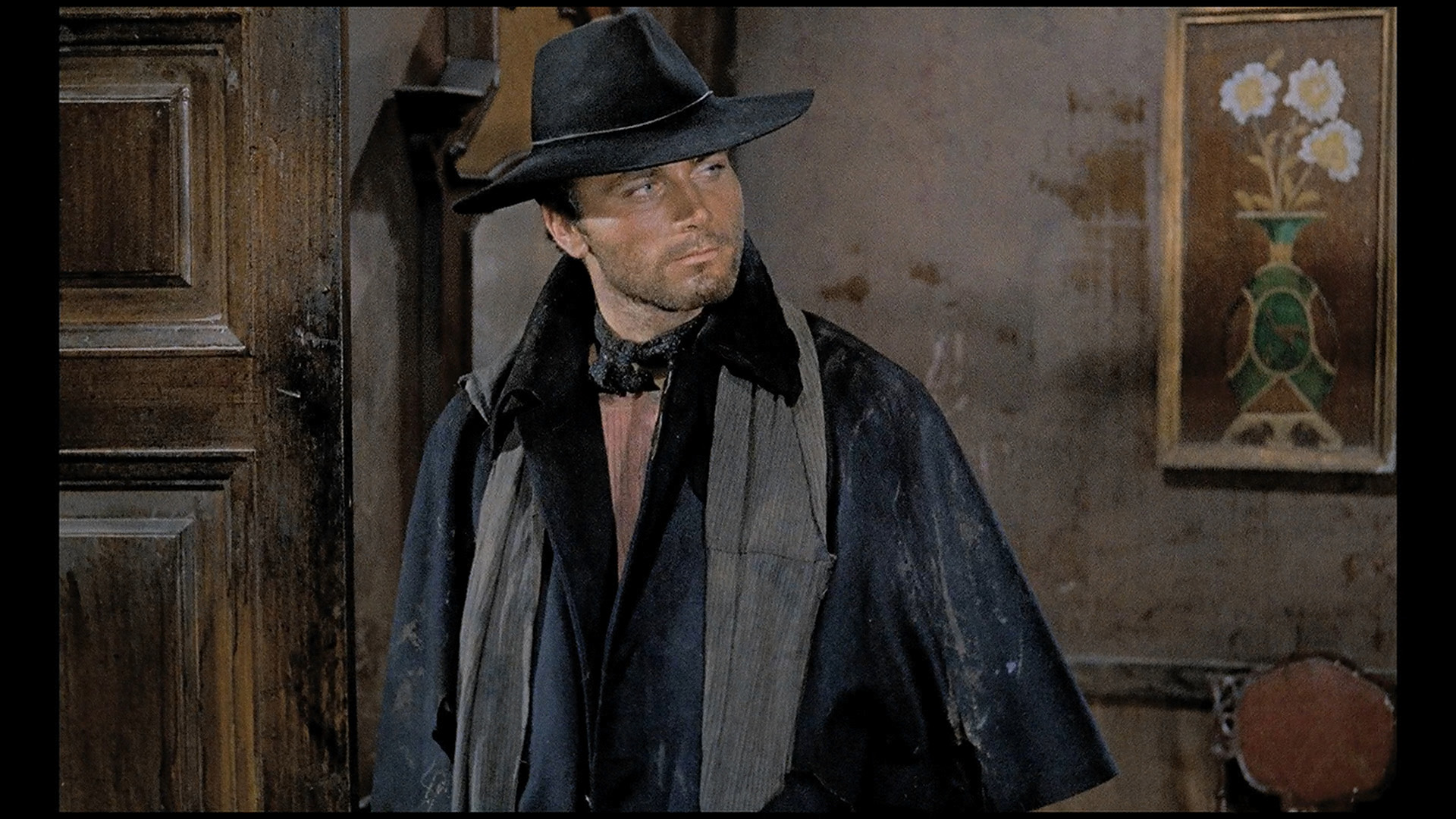
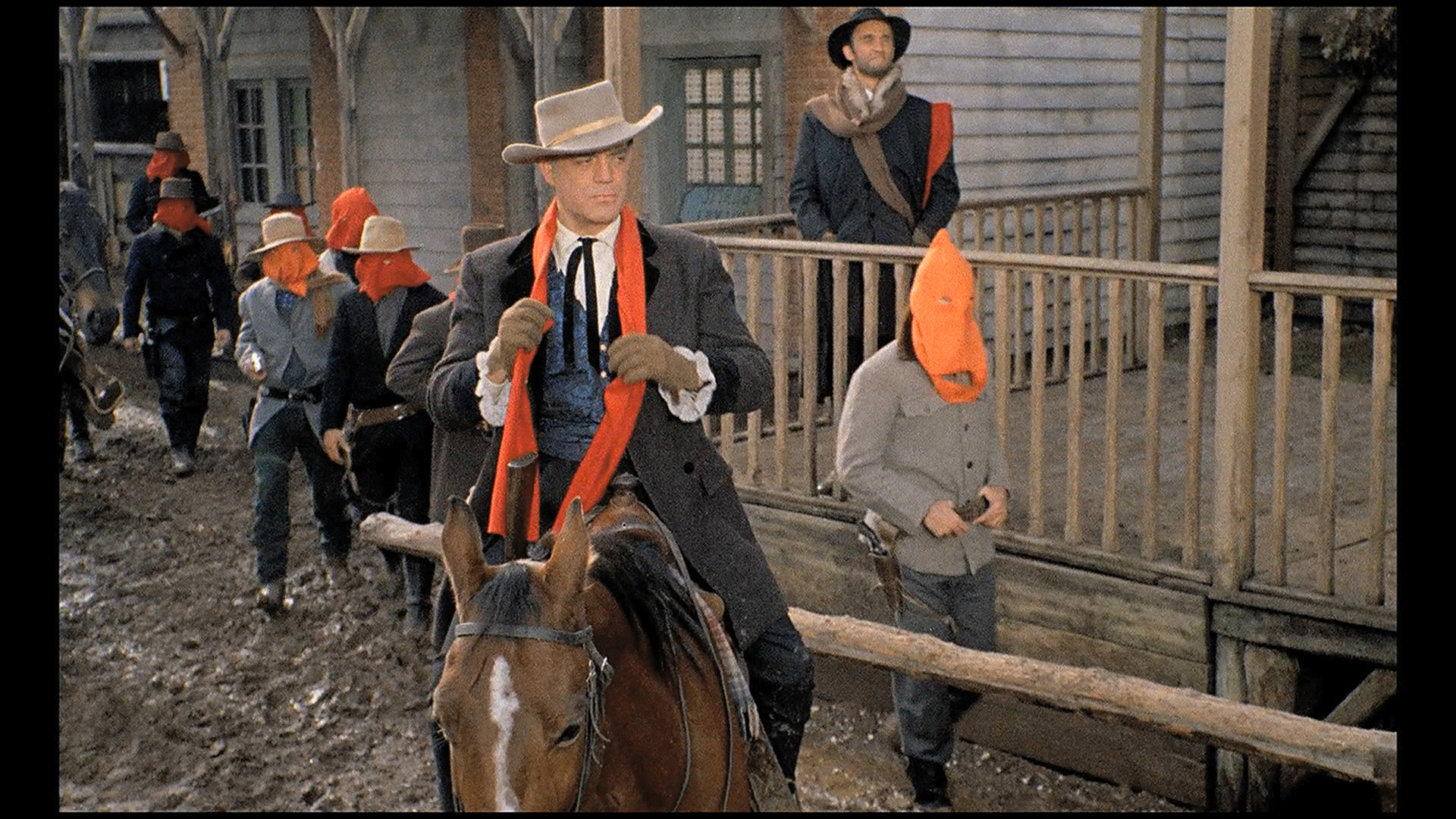
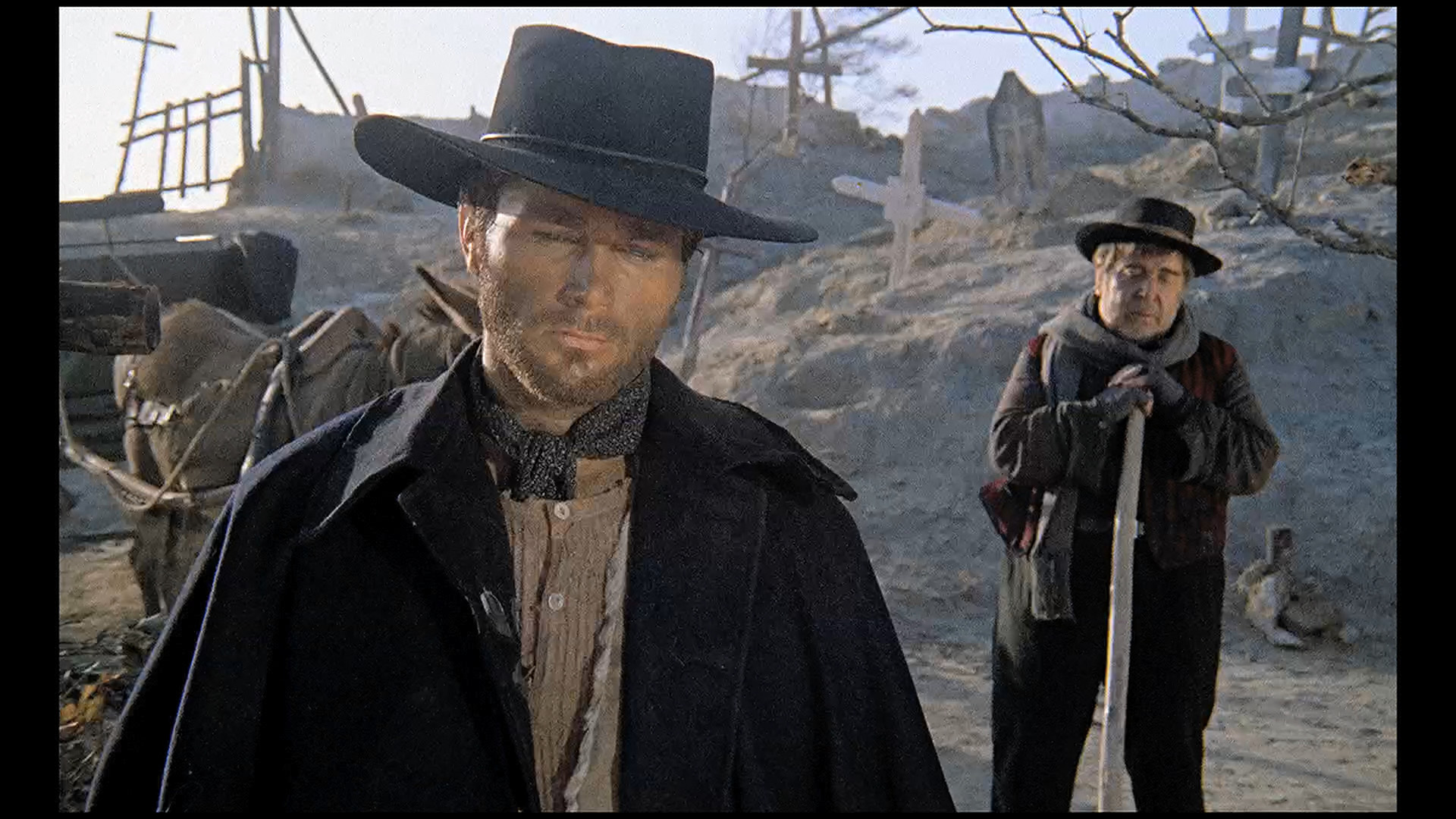
Anchor Bay (DVD)
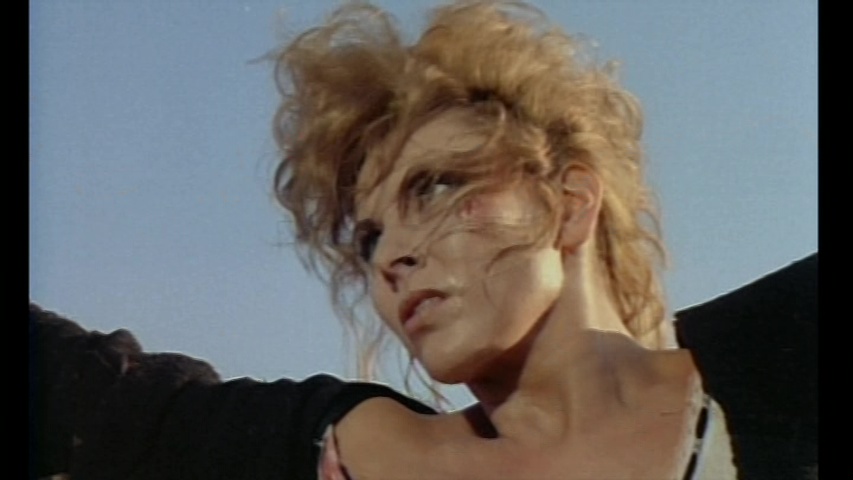
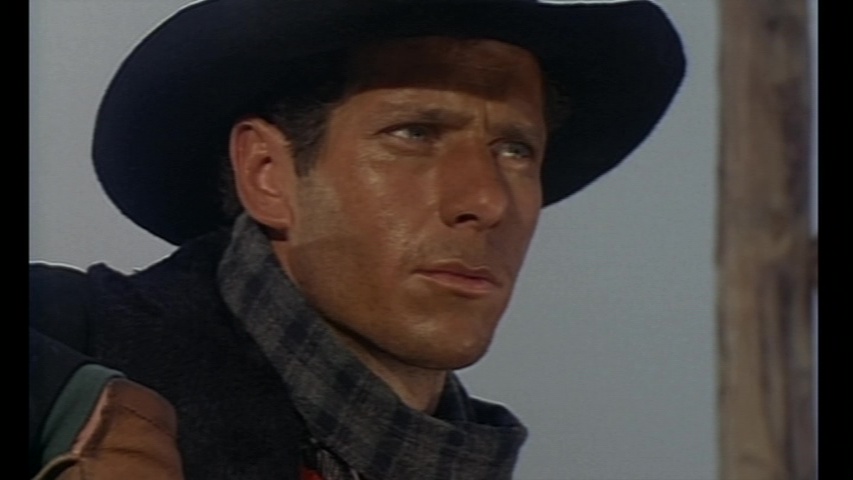
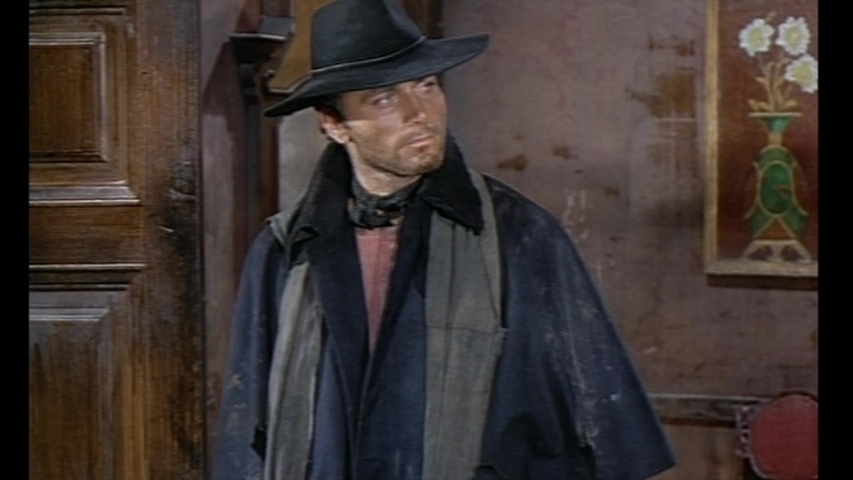
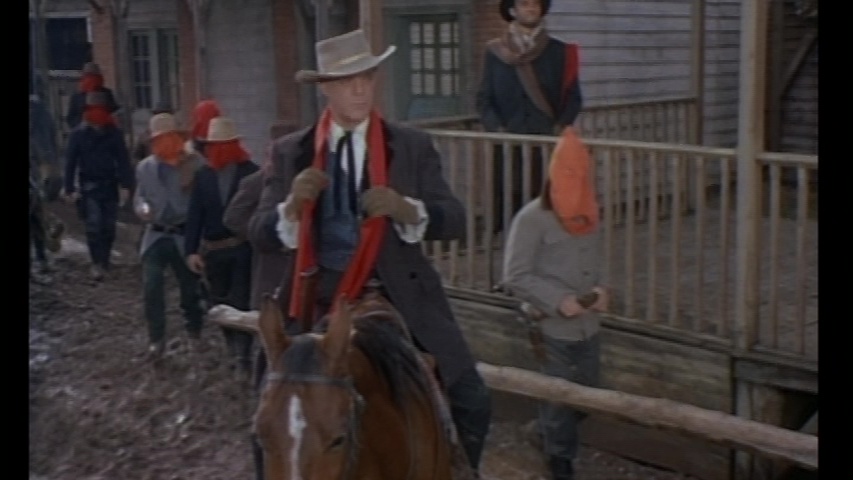
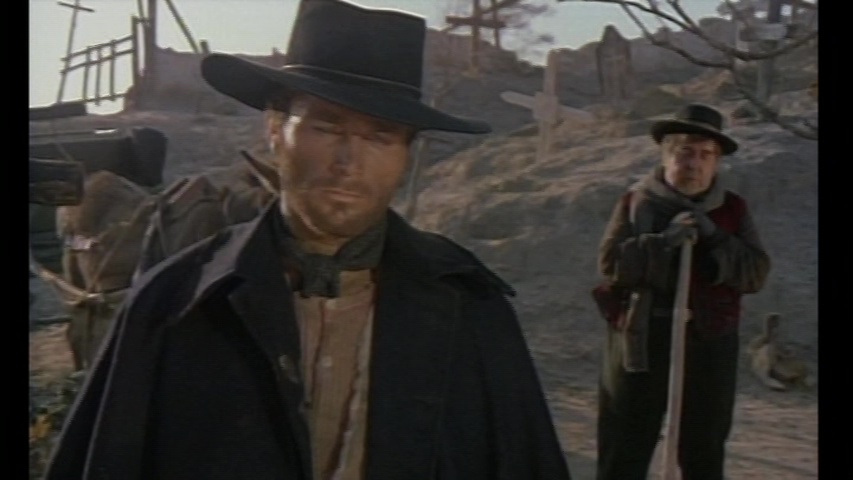
Updated review on January 28, 2024.



 the name "Django" has long been synonymous with action-filled spaghetti westerns. For everyone else, it regrettably meant very
the name "Django" has long been synonymous with action-filled spaghetti westerns. For everyone else, it regrettably meant very  little for many years. A contemporary of Sergio Leone's legendary Dollars films with Clint Eastwood, Django is a much dirtier, rougher film which also injects conventions of Japanese cinema and pulp novels into the western framework. Perhaps due to its difficult title, Django never broke out of cult status in America but spread like wildfire over Europe, kicking off a host of tangentially related imitators which continued into the 1980s (and even beyond if you count Sukiyaki Western Django).
little for many years. A contemporary of Sergio Leone's legendary Dollars films with Clint Eastwood, Django is a much dirtier, rougher film which also injects conventions of Japanese cinema and pulp novels into the western framework. Perhaps due to its difficult title, Django never broke out of cult status in America but spread like wildfire over Europe, kicking off a host of tangentially related imitators which continued into the 1980s (and even beyond if you count Sukiyaki Western Django).
 one sort-of-official Terence Hill sequel), complete with an eye-popping array of Italian poster art. Extra supplements include a trio of brief theatrical trailers (all pretty much the same in
one sort-of-official Terence Hill sequel), complete with an eye-popping array of Italian poster art. Extra supplements include a trio of brief theatrical trailers (all pretty much the same in  tone), a 6m56s Franco Nero interview in which the well-preserved actor fondly discusses his legendary role, and a "Django shooting game" the viewer can play with the DVD remote control. Packaged with Anchor Bay's original Django two-disc edition comes a much more obscure companion feature, Django Strikes Back, in which Franco Nero reprises his role twenty years later. Originally released in Italy as Django 2: Il Grande Ritorno, the film was never officially released in the United States, even as a straight to video title. While the character may be the same, the jungle setting, low budget '80s photography, and massive rapid-fire gun play put this more in the league of Italy's Rambo knockoffs, such as the Indio series. Adding to the peculiarity of the project is a Laura Gemser-style bondage queen figure and some increased salacious sexual material, far more blatant than what was suggested in the first film. Of course, the character of Django seemed more interested in pleasures of the flesh than the average "Man with No Name" spaghetti western hero, so this may have been a logical step forward.
After years of living in solitude as a monk, Django is called back into service to rescue his daughter from the clutches of the evil Christopher Connelly (sporting a funny Udo Kier accent), who is running a steamer through the South American jungle. Along the way he meets the peculiar Gunn (Donald Pleasence) and a host of other bizarre characters before finally breaking out his trusty Gatling gun. While it's always good to see Nero back in action, Django Strikes Again never really catches fire like the original film. The constant waffling between genres, coupled with flat direction by "Ted Archer" (Nello Rossatti), makes it more of a passable action piece than a true return to form, but its long overdue release is certainly welcome. This edition includes a subtitled five-minute Italian prologue scissored from the English print prepared for export, basically an amusing vignette with two old timers trying to recall the name of "that guy with the coffin" before being blown away. Aside from the slightly dupey opening, the image quality is very good, if a bit murky during the night scenes. The English surround soundtrack features most of the performers' original voices, a very welcome touch, but features a rather primitive sound mix with some sloppy channel separation (ditto for the alternate Italian track). Also included is the trailer and another brief Nero interview in which he discusses the genesis of the sequel. Both films feature
tone), a 6m56s Franco Nero interview in which the well-preserved actor fondly discusses his legendary role, and a "Django shooting game" the viewer can play with the DVD remote control. Packaged with Anchor Bay's original Django two-disc edition comes a much more obscure companion feature, Django Strikes Back, in which Franco Nero reprises his role twenty years later. Originally released in Italy as Django 2: Il Grande Ritorno, the film was never officially released in the United States, even as a straight to video title. While the character may be the same, the jungle setting, low budget '80s photography, and massive rapid-fire gun play put this more in the league of Italy's Rambo knockoffs, such as the Indio series. Adding to the peculiarity of the project is a Laura Gemser-style bondage queen figure and some increased salacious sexual material, far more blatant than what was suggested in the first film. Of course, the character of Django seemed more interested in pleasures of the flesh than the average "Man with No Name" spaghetti western hero, so this may have been a logical step forward.
After years of living in solitude as a monk, Django is called back into service to rescue his daughter from the clutches of the evil Christopher Connelly (sporting a funny Udo Kier accent), who is running a steamer through the South American jungle. Along the way he meets the peculiar Gunn (Donald Pleasence) and a host of other bizarre characters before finally breaking out his trusty Gatling gun. While it's always good to see Nero back in action, Django Strikes Again never really catches fire like the original film. The constant waffling between genres, coupled with flat direction by "Ted Archer" (Nello Rossatti), makes it more of a passable action piece than a true return to form, but its long overdue release is certainly welcome. This edition includes a subtitled five-minute Italian prologue scissored from the English print prepared for export, basically an amusing vignette with two old timers trying to recall the name of "that guy with the coffin" before being blown away. Aside from the slightly dupey opening, the image quality is very good, if a bit murky during the night scenes. The English surround soundtrack features most of the performers' original voices, a very welcome touch, but features a rather primitive sound mix with some sloppy channel separation (ditto for the alternate Italian track). Also included is the trailer and another brief Nero interview in which he discusses the genesis of the sequel. Both films feature  some terrific animated menus, including hilarious faux-Spanish menu options and nifty bullet-ripping
some terrific animated menus, including hilarious faux-Spanish menu options and nifty bullet-ripping  effects.
effects. Corbucci. It's definitely 38 minutes wonderfully spent. Also included are both the international trailer and the more recently uncovered Italian
Corbucci. It's definitely 38 minutes wonderfully spent. Also included are both the international trailer and the more recently uncovered Italian  trailer.
trailer. 























